
Tips for Online Students , Tips for Students

How To Write An Essay: Beginner Tips And Tricks
Updated: July 11, 2022
Published: June 22, 2021

Many students dread writing essays, but essay writing is an important skill to develop in high school, university, and even into your future career. By learning how to write an essay properly, the process can become more enjoyable and you’ll find you’re better able to organize and articulate your thoughts.
When writing an essay, it’s common to follow a specific pattern, no matter what the topic is. Once you’ve used the pattern a few times and you know how to structure an essay, it will become a lot more simple to apply your knowledge to every essay.
No matter which major you choose, you should know how to craft a good essay. Here, we’ll cover the basics of essay writing, along with some helpful tips to make the writing process go smoothly.

Photo by Laura Chouette on Unsplash
Types of Essays
Think of an essay as a discussion. There are many types of discussions you can have with someone else. You can be describing a story that happened to you, you might explain to them how to do something, or you might even argue about a certain topic.
When it comes to different types of essays, it follows a similar pattern. Like a friendly discussion, each type of essay will come with its own set of expectations or goals.
For example, when arguing with a friend, your goal is to convince them that you’re right. The same goes for an argumentative essay.
Here are a few of the main essay types you can expect to come across during your time in school:
Narrative Essay
This type of essay is almost like telling a story, not in the traditional sense with dialogue and characters, but as if you’re writing out an event or series of events to relay information to the reader.
Persuasive Essay
Here, your goal is to persuade the reader about your views on a specific topic.
Descriptive Essay
This is the kind of essay where you go into a lot more specific details describing a topic such as a place or an event.
Argumentative Essay
In this essay, you’re choosing a stance on a topic, usually controversial, and your goal is to present evidence that proves your point is correct.
Expository Essay
Your purpose with this type of essay is to tell the reader how to complete a specific process, often including a step-by-step guide or something similar.
Compare and Contrast Essay
You might have done this in school with two different books or characters, but the ultimate goal is to draw similarities and differences between any two given subjects.
The Main Stages of Essay Writing
When it comes to writing an essay, many students think the only stage is getting all your ideas down on paper and submitting your work. However, that’s not quite the case.
There are three main stages of writing an essay, each one with its own purpose. Of course, writing the essay itself is the most substantial part, but the other two stages are equally as important.
So, what are these three stages of essay writing? They are:
Preparation
Before you even write one word, it’s important to prepare the content and structure of your essay. If a topic wasn’t assigned to you, then the first thing you should do is settle on a topic. Next, you want to conduct your research on that topic and create a detailed outline based on your research. The preparation stage will make writing your essay that much easier since, with your outline and research, you should already have the skeleton of your essay.
Writing is the most time-consuming stage. In this stage, you will write out all your thoughts and ideas and craft your essay based on your outline. You’ll work on developing your ideas and fleshing them out throughout the introduction, body, and conclusion (more on these soon).
In the final stage, you’ll go over your essay and check for a few things. First, you’ll check if your essay is cohesive, if all the points make sense and are related to your topic, and that your facts are cited and backed up. You can also check for typos, grammar and punctuation mistakes, and formatting errors.
The Five-Paragraph Essay
We mentioned earlier that essay writing follows a specific structure, and for the most part in academic or college essays , the five-paragraph essay is the generally accepted structure you’ll be expected to use.
The five-paragraph essay is broken down into one introduction paragraph, three body paragraphs, and a closing paragraph. However, that doesn’t always mean that an essay is written strictly in five paragraphs, but rather that this structure can be used loosely and the three body paragraphs might become three sections instead.
Let’s take a closer look at each section and what it entails.
Introduction
As the name implies, the purpose of your introduction paragraph is to introduce your idea. A good introduction begins with a “hook,” something that grabs your reader’s attention and makes them excited to read more.
Another key tenant of an introduction is a thesis statement, which usually comes towards the end of the introduction itself. Your thesis statement should be a phrase that explains your argument, position, or central idea that you plan on developing throughout the essay.
You can also include a short outline of what to expect in your introduction, including bringing up brief points that you plan on explaining more later on in the body paragraphs.
Here is where most of your essay happens. The body paragraphs are where you develop your ideas and bring up all the points related to your main topic.
In general, you’re meant to have three body paragraphs, or sections, and each one should bring up a different point. Think of it as bringing up evidence. Each paragraph is a different piece of evidence, and when the three pieces are taken together, it backs up your main point — your thesis statement — really well.
That being said, you still want each body paragraph to be tied together in some way so that the essay flows. The points should be distinct enough, but they should relate to each other, and definitely to your thesis statement. Each body paragraph works to advance your point, so when crafting your essay, it’s important to keep this in mind so that you avoid going off-track or writing things that are off-topic.
Many students aren’t sure how to write a conclusion for an essay and tend to see their conclusion as an afterthought, but this section is just as important as the rest of your work.
You shouldn’t be presenting any new ideas in your conclusion, but you should summarize your main points and show how they back up your thesis statement.
Essentially, the conclusion is similar in structure and content to the introduction, but instead of introducing your essay, it should be wrapping up the main thoughts and presenting them to the reader as a singular closed argument.

Photo by AMIT RANJAN on Unsplash
Steps to Writing an Essay
Now that you have a better idea of an essay’s structure and all the elements that go into it, you might be wondering what the different steps are to actually write your essay.
Don’t worry, we’ve got you covered. Instead of going in blind, follow these steps on how to write your essay from start to finish.
Understand Your Assignment
When writing an essay for an assignment, the first critical step is to make sure you’ve read through your assignment carefully and understand it thoroughly. You want to check what type of essay is required, that you understand the topic, and that you pay attention to any formatting or structural requirements. You don’t want to lose marks just because you didn’t read the assignment carefully.
Research Your Topic
Once you understand your assignment, it’s time to do some research. In this step, you should start looking at different sources to get ideas for what points you want to bring up throughout your essay.
Search online or head to the library and get as many resources as possible. You don’t need to use them all, but it’s good to start with a lot and then narrow down your sources as you become more certain of your essay’s direction.
Start Brainstorming
After research comes the brainstorming. There are a lot of different ways to start the brainstorming process . Here are a few you might find helpful:
- Think about what you found during your research that interested you the most
- Jot down all your ideas, even if they’re not yet fully formed
- Create word clouds or maps for similar terms or ideas that come up so you can group them together based on their similarities
- Try freewriting to get all your ideas out before arranging them
Create a Thesis
This is often the most tricky part of the whole process since you want to create a thesis that’s strong and that you’re about to develop throughout the entire essay. Therefore, you want to choose a thesis statement that’s broad enough that you’ll have enough to say about it, but not so broad that you can’t be precise.
Write Your Outline
Armed with your research, brainstorming sessions, and your thesis statement, the next step is to write an outline.
In the outline, you’ll want to put your thesis statement at the beginning and start creating the basic skeleton of how you want your essay to look.
A good way to tackle an essay is to use topic sentences . A topic sentence is like a mini-thesis statement that is usually the first sentence of a new paragraph. This sentence introduces the main idea that will be detailed throughout the paragraph.
If you create an outline with the topic sentences for your body paragraphs and then a few points of what you want to discuss, you’ll already have a strong starting point when it comes time to sit down and write. This brings us to our next step…
Write a First Draft
The first time you write your entire essay doesn’t need to be perfect, but you do need to get everything on the page so that you’re able to then write a second draft or review it afterward.
Everyone’s writing process is different. Some students like to write their essay in the standard order of intro, body, and conclusion, while others prefer to start with the “meat” of the essay and tackle the body, and then fill in the other sections afterward.
Make sure your essay follows your outline and that everything relates to your thesis statement and your points are backed up by the research you did.
Revise, Edit, and Proofread
The revision process is one of the three main stages of writing an essay, yet many people skip this step thinking their work is done after the first draft is complete.
However, proofreading, reviewing, and making edits on your essay can spell the difference between a B paper and an A.
After writing the first draft, try and set your essay aside for a few hours or even a day or two, and then come back to it with fresh eyes to review it. You might find mistakes or inconsistencies you missed or better ways to formulate your arguments.
Add the Finishing Touches
Finally, you’ll want to make sure everything that’s required is in your essay. Review your assignment again and see if all the requirements are there, such as formatting rules, citations, quotes, etc.
Go over the order of your paragraphs and make sure everything makes sense, flows well, and uses the same writing style .
Once everything is checked and all the last touches are added, give your essay a final read through just to ensure it’s as you want it before handing it in.
A good way to do this is to read your essay out loud since you’ll be able to hear if there are any mistakes or inaccuracies.
Essay Writing Tips
With the steps outlined above, you should be able to craft a great essay. Still, there are some other handy tips we’d recommend just to ensure that the essay writing process goes as smoothly as possible.
- Start your essay early. This is the first tip for a reason. It’s one of the most important things you can do to write a good essay. If you start it the night before, then you won’t have enough time to research, brainstorm, and outline — and you surely won’t have enough time to review.
- Don’t try and write it in one sitting. It’s ok if you need to take breaks or write it over a few days. It’s better to write it in multiple sittings so that you have a fresh mind each time and you’re able to focus.
- Always keep the essay question in mind. If you’re given an assigned question, then you should always keep it handy when writing your essay to make sure you’re always working to answer the question.
- Use transitions between paragraphs. In order to improve the readability of your essay, try and make clear transitions between paragraphs. This means trying to relate the end of one paragraph to the beginning of the next one so the shift doesn’t seem random.
- Integrate your research thoughtfully. Add in citations or quotes from your research materials to back up your thesis and main points. This will show that you did the research and that your thesis is backed up by it.
Wrapping Up
Writing an essay doesn’t need to be daunting if you know how to approach it. Using our essay writing steps and tips, you’ll have better knowledge on how to write an essay and you’ll be able to apply it to your next assignment. Once you do this a few times, it will become more natural to you and the essay writing process will become quicker and easier.
If you still need assistance with your essay, check with a student advisor to see if they offer help with writing. At University of the People(UoPeople), we always want our students to succeed, so our student advisors are ready to help with writing skills when necessary.
Related Articles
- Tips for Reading an Assignment Prompt
- Asking Analytical Questions
- Introductions
- What Do Introductions Across the Disciplines Have in Common?
- Anatomy of a Body Paragraph
- Transitions
- Tips for Organizing Your Essay
- Counterargument
- Conclusions
- Strategies for Essay Writing: Downloadable PDFs
- Brief Guides to Writing in the Disciplines
If you're seeing this message, it means we're having trouble loading external resources on our website.
If you're behind a web filter, please make sure that the domains *.kastatic.org and *.kasandbox.org are unblocked.
To log in and use all the features of Khan Academy, please enable JavaScript in your browser.
College admissions
Course: college admissions > unit 4.
- Writing a strong college admissions essay
- Avoiding common admissions essay mistakes
- Brainstorming tips for your college essay
- How formal should the tone of your college essay be?
- Taking your college essay to the next level
- Sample essay 1 with admissions feedback
- Sample essay 2 with admissions feedback
- Student story: Admissions essay about a formative experience
- Student story: Admissions essay about personal identity
- Student story: Admissions essay about community impact
- Student story: Admissions essay about a past mistake
- Student story: Admissions essay about a meaningful poem
Writing tips and techniques for your college essay
Pose a question the reader wants answered, don't focus exclusively on the past, experiment with the unexpected, don't summarize, want to join the conversation.
- Upvote Button navigates to signup page
- Downvote Button navigates to signup page
- Flag Button navigates to signup page


- SUGGESTED TOPICS
- The Magazine
- Newsletters
- Managing Yourself
- Managing Teams
- Work-life Balance
- The Big Idea
- Data & Visuals
- Reading Lists
- Case Selections
- HBR Learning
- Topic Feeds
- Account Settings
- Email Preferences
A (Very) Simple Way to Improve Your Writing
- Mark Rennella

It’s called the “one-idea rule” — and any level of writer can use it.
The “one idea” rule is a simple concept that can help you sharpen your writing, persuade others by presenting your argument in a clear, concise, and engaging way. What exactly does the rule say?
- Every component of a successful piece of writing should express only one idea.
- In persuasive writing, your “one idea” is often the argument or belief you are presenting to the reader. Once you identify what that argument is, the “one-idea rule” can help you develop, revise, and connect the various components of your writing.
- For instance, let’s say you’re writing an essay. There are three components you will be working with throughout your piece: the title, the paragraphs, and the sentences.
- Each of these parts should be dedicated to just one idea. The ideas are not identical, of course, but they’re all related. If done correctly, the smaller ideas (in sentences) all build (in paragraphs) to support the main point (suggested in the title).
Where your work meets your life. See more from Ascend here .
Most advice about writing looks like a long laundry list of “do’s and don’ts.” These lists can be helpful from time to time, but they’re hard to remember … and, therefore, hard to depend on when you’re having trouble putting your thoughts to paper. During my time in academia, teaching composition at the undergraduate and graduate levels, I saw many people struggle with this.
- MR Mark Rennella is Associate Editor at HBP and has published two books, Entrepreneurs, Managers, and Leaders and The Boston Cosmopolitans .
Partner Center
Ultimate Guide to Writing Your College Essay
Tips for writing an effective college essay.
College admissions essays are an important part of your college application and gives you the chance to show colleges and universities your character and experiences. This guide will give you tips to write an effective college essay.
Want free help with your college essay?
UPchieve connects you with knowledgeable and friendly college advisors—online, 24/7, and completely free. Get 1:1 help brainstorming topics, outlining your essay, revising a draft, or editing grammar.
Writing a strong college admissions essay
Learn about the elements of a solid admissions essay.
Avoiding common admissions essay mistakes
Learn some of the most common mistakes made on college essays
Brainstorming tips for your college essay
Stuck on what to write your college essay about? Here are some exercises to help you get started.
How formal should the tone of your college essay be?
Learn how formal your college essay should be and get tips on how to bring out your natural voice.
Taking your college essay to the next level
Hear an admissions expert discuss the appropriate level of depth necessary in your college essay.
Student Stories
Student Story: Admissions essay about a formative experience
Get the perspective of a current college student on how he approached the admissions essay.
Student Story: Admissions essay about personal identity
Get the perspective of a current college student on how she approached the admissions essay.
Student Story: Admissions essay about community impact
Student story: admissions essay about a past mistake, how to write a college application essay, tips for writing an effective application essay, sample college essay 1 with feedback, sample college essay 2 with feedback.
This content is licensed by Khan Academy and is available for free at www.khanacademy.org.
Study for an Essay Test
And the Rest will Follow
- Writing Essays
- Writing Research Papers
- English Grammar
- M.Ed., Education Administration, University of Georgia
- B.A., History, Armstrong State University
Test day is here. You’ve packed your brain full of definitions, dates, and details, preparing for a marathon of multiple choice and true & false questions, and now you’re staring at a single, solitary, terrifying essay question.
How could this happen? You’re suddenly fighting for your life (okay, a grade), and your only weapons are a blank piece of paper and a pencil. What can you do? Next time, prepare for the test as if you know it will be an essay test.
Why Do Teachers Use Essay Questions?
Essay questions are based on themes and overall ideas. Teachers like to use essay questions because they give students the opportunity to express everything they’ve learned over the weeks or months, using their own words. Essay test answers reveal more than the bare facts, though. When submitting essay answers, students are expected to cover lots of information in an organized, sensible manner.
But what if you prepare for an essay question and the teacher doesn’t ask one? No problem. If you use these tips and understand the themes and ideas of the test period, the other questions will come easily.
4 Essay Question Study Tips
- Review chapter titles. Textbook chapters often refer to themes. Look at each relevant title and think of smaller ideas, chains of events, and relevant terms that fit within that theme.
- As you take notes, look for teacher code words. If you hear your teacher use words like “once again we see” or “another similar event occurred,” make note of it. Anything that indicates a pattern or chain of events is key.
- Think of a theme every day. Every few nights as you review your class notes , look for themes. Come up with your own essay questions based on your themes.
- Practice your essay questions. As you do, make sure you use vocabulary terms found in your notes and text. Underline them as you go, and go back to review their relevance.
If you take effective notes and think in terms of themes as you study each night, you’ll be prepared for every type of test question. You’ll soon find that, in understanding the theme of each lesson or chapter, you’ll begin to think more like your teacher thinks. You will also begin to form a deeper understanding of the test material overall.
- How to Study for a Test or Final
- Preparing for Final Exams
- Best Practices for Subjective Test Questions
- How to Study History Terms
- 10 Common Test Mistakes
- How to Study for Fill in the Blank Tests
- Study Tips for Math Homework and Math Tests
- Top 15 Test Tips for Multiple Choice
- Study Tips for the GRE Vocabulary Section
- Writing Practice Tests While You Study
- 6 Study Tips for Visual Learners
- How to Study the Night Before a Test
- Study Habits That Can Improve Grades and Performance
- 3 Steps to Ace Your Next Test
- Top 15 ACT Tips to Ace the Test
- The Case for the Importance of Taking Notes
How to Study Effectively: 15 Tips for 2024

- 💪 Student Superheroes
- 🙌 Path to Success
- 🏁 Be Ready!
- ⏱ Manage Your Time
- 📖 Learning and Memorizing
- 😰 Controlling Test Anxiety
Ever wondered how to study effectively? Why does one of your classmates need just a couple of hours to memorize information and pass an exam with flying colors? And why does another spend a night cramming material and still struggle to recall anything?
Actually, the answer to all of that:
Effective studying comes from regularity and consistently implemented habits. If you want to make the best of your time spent learning, you have to find an approach and study tips that work for you. Thankfully, that’s why our IvyPanda team has developed this guide.
Below, you will find how to study smart, essay writing tips, and tricks for managing your anxiety.
💪 Student superheroes
You have probably heard of the trait theory of leadership. According to it, some people are born to become leaders . They just have some features in their blood .
Such students have numerous advantages compared to others as they can:
- acquire information quicker,
- study for exams faster,
- pass tests without being nervous.
Maybe some people are born to be the best. Yet, it is total nonsense to say that all students who spend less time studying belong to this group of people.
The successful passing of exams depends on understanding how learning works. Studying is a skill, and cramming all night before the exam is not a secret ingredient of success.
🙌 Path to success
Having good study habits presupposes knowing your strengths and weaknesses, using different study methods, and organizing the process. One can acquire valuable skills by paying attention to the organization of the process of learning first.
Your strategy should include the following steps :
- Preparation for studying;
- Time-management;
- Learning and memorizing;
- Controlling test anxiety.
🏁 Be ready!
Effective studying never starts from opening the book. It requires the whole organization process to take place before anything. Thus, before studying, you have to prepare yourself and your study materials.
1. Set goals
First of all, you should prepare for your study by setting goals. They are necessary to make you keep going. Don’t underestimate their power.
Be sure that:
- You know why you are studying. It can be for scraping through the exam, finishing college, getting good grades, satisfying your parents, or having professional knowledge for your future career. No matter what your goal is, it should be an impetus for studying;
- Your goals are achievable. You should be able to achieve them within a particular period of time and with substantial effort. No need for making over-optimistic promises — be realistic!

2. Choose the place for studying
This decision is up to you alone. You should find a place where you feel comfortable (but not comfortable for sleeping). Some people can study with background music , while others need silence.
You will know how to study smart with some of these tips:
- Light matters. The place you have chosen should be well lit. Areas with poor lighting are more likely to make you sleepy;
- Noise matters. If you need background noise, you may go to the café or turn on some music. Meanwhile, a library may be the best option for people who prefer absolute silence.
- Time matters. You should not make yourself wake up early in the morning and study just because it works for that friend of yours. If you are a night owl, feel free to study in the evening.
3. Avoid distractions and boost productivity
Numerous things that you use are invisible thieves of your energy and concentration:
- Studying while the television is on may result in constant distraction from thoughtful reading.
- The same is true with your smartphone. Answering incoming calls leads to wasted time. As a result, you become tired before you have managed to study anything.
- The Internet is probably your enemy as well. If you need a computer, close all social media, and concentrate on your task.
What’s the bottom line?
You can boost productivity in many ways. It can be drinking coffee or listening to classical music. You should know what makes you active and use it for your studying.

4. Stay motivated
Attitude and mindset play a crucial role in successful and easy studying. ‘I don’t feel like studying’ is a widespread reason to avoid doing something worthwhile. Follow these easy recommendations, and you will be impressed at how they will change your attitude towards studying:
- Don’t underestimate yourself. Remind yourself that you have the necessary study skills and can achieve anything. You should always be your greatest supporter.
- No negative thinking. Thoughts like, ‘I will never do it,’ ‘I can’t stand doing it anymore, ‘I’m a total failure, I will fail it for sure’ are not acceptable if you want to pass your exam.
- Don’t compare yourself to others. Thoughts like, ‘I bet that Meggy has already studied half of the book’ is an unnecessary distraction. Such ideas only increase your dissatisfaction and demotivate you.
In essence, attitude towards learning habits and upcoming exams is what differentiates quick learners from others in most cases. Self-confidence is a great determiner of success.
⏱ Manage your time
The proper division of time is one of the most critical study tips. The disorganization and constant putting off until tomorrow are two major problems.
5. Avoid procrastination
Currently, putting away tasks for later seems to be one of the most pressing problems for students. A study of procrastination among students has shown that 80-95% of students procrastinate. Most of them justify that fact by stating that working under pressure improves their efficiency. However, the study results have demonstrated that there is a connection between low GPA and procrastination habits.
To avoid it, you should:
6. Schedule every hour
If you want to know how to study effectively, you have to manage your time correctly. It is halfway to success. If you doubt whether you are a procrastinator, do this test to find out.
Yet, our tips on time management can be helpful regardless of the results:
- Make a to-do list . Nothing can be easier than writing down everything you have to do. Make a list of all your tasks and give them deadlines. Then, write down the assignments with the shortest deadlines first. Classify these as urgent depending on their priority. Lastly, make a final list of what should be done first.
- Use a tool for organizing. It can be an app on your phone or a calendar with crucial tasks circled in red. You should find the most efficient way to remind yourself about the upcoming deadlines.
- Count every minute. Be precise when planning your schedule. Think about the necessary amount of time for the particular task, and don’t overvalue your possibilities. Always take into account potential delays and leave time for planning.
In fact, students are expected to spend 35 hours a week studying. Check how many hours you need to attend all classes. Then, use the rest of the time for independent work.
📖 Learning and memorizing
Some students tend to try different memorizing techniques without considering their learning style. For example, a student needs to hear the information they want to remember. In this case, highlighting essential parts of the text won’t be as efficient as it is for a visual learner.
That’s why:
7. Know your learning style
Identify your learning style and choose appropriate techniques for study. People are generally divided into three types of learners :
- Visuals are those who learn by seeing something. Highlighting does work for such people.
- Auditory learners who prefer listening. It is advisable for this type of learner to speak with others, read aloud, or record themselves.
- Tactile learners learn something new by doing it. They need to practice if they want to memorize the theory.
If you are not sure about your learning style, follow this link and find it out by answering these simple questions.

8. Use different study tips for memorization
You have chosen a place for study, got rid of all distractions, and evaluated the urgency of your tasks. Half the work is done. Now it is time to start working on your study habits. Many articles emphasize the significance of such techniques as visiting lectures, making notes , or reading before bed.
Such study tips are helpful, but they are not universal. They don’t work for every single student. That’s why you have to try out and implement different recommendations at the same time.
Here are some creative techniques for study:
- The system of rewards . Promise yourself that you will buy that fancy dress or watch (or anything else you want) after passing the exam. This type may be classified as a long-term extrinsic motivator. Also, you can make the process of studying more pleasant by giving yourself little treats. For example, let yourself eat or drink something delicious when you finish some part of your studying.
- Read upside down . This study habit is efficient if you need to cram something. Yes, cramming is believed to be an ineffective method of studying. Yet, every student knows that sometimes there is no other way out. When you read upside down, you have to focus better. Otherwise, you won’t be able to understand the meaning of the text. Concentrating on something makes you memorize and comprehend it quicker.
- Teach somebody . This method is fantastic, and it works in most cases. When you teach someone, you have to explain the topic. No explanation is possible without understanding . Consequently, you will have to do your best to describe the issue to your friend (or anybody else, including you) so that they can get it.
Also, you can always search a free essay database for either more tips or to get some extra info on the topic you’re studying.
9. Use flashcards
Flashcards are handy for becoming a better learner:
- Write down essential facts using bullet points, different colors and fonts to enhance visual perception.
- Take them with you everywhere you go and don’t miss the opportunity to read them during the so-called ‘dead times’ (waiting for a bus, standing in a queue).
- You can even pin them to your fridge or bathroom mirror. This way, they will always be in your sight.
- Use flashcards in group activities with your classmates.
Moreover, you can keep them on your smartphone or computer by using specific apps! Here are some examples perfect for university and college students:
- GoConqr – with this app, you can use great flashcards made just for visual learning or create your own set. Add images, formulas, and text to make your flashcards.
- Cram – almost 200 million cards for learning online. You can read cards or enable audio records.
10. Use our checklist
Each time you study, you can try different study techniques. For this purpose, keep this checklist around:
Find out more great study habits that are scientifically proved in this video .
😰 Controlling text anxiety
Even for a well-prepared student, anxiety may spoil everything , especially before an exam. Being too nervous may result in poor concentration and, as a result, a bad grade. People who pass exams easily know not only how to study but how to stay calm.
Here are some tips on how to stay relaxed during your test:
11. Read the tasks and use samples
Read all instructions carefully and follow directions exactly. Whether it’s a chemistry, physics, or history test—understanding the task is the most significant start for a successful score.
If you still don’t feel prepared for the test, try out a couple of online exams. Find some test questions that may appear on your future exam.
Finding essay samples on any topic is possible. Analyze them, and you won’t have to develop your own paper from scratch:
- 125 College Essay Examples for 13 Schools + Expert Analysis– an enormous pick of college essay samples for practice.
- Writing Sample Essays – an excellent essay analysis you can use as learning material. You’ll learn what standards to follow when writing a paper.
- Essay Questions – this is an excellent option for those who are struggling with anxiety. All essay questions are fun and exciting to read. They also help you find a creative way of writing on your own.
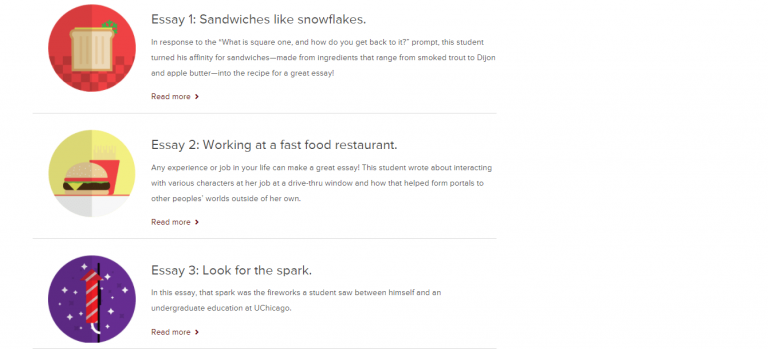
12. Stay positive and healthy
According to statistics, 25% of school students are affected by test anxiety . It doesn’t only affect their academic performance. It impacts health, giving such symptoms as nausea, stomach pain, headaches, and shortness of breath.
You can’t let yourself be stressed all the time. Take some time to read workbooks, do exercises, and make other preparations. But then, take some time to relax, eat healthily, have a good night’s sleep, and build your confidence.
13. Breathe
If you feel too worried, try taking slow, deep breaths that will cool you down.
If feelings of panic and anxiety are familiar to you, it’s great to learn the 4×4 breathing technique. Navy SEALs use it and, if performed correctly, it eliminates all the negative signs of anxiety.
To perform it, follow these instructions:
- Inhale for 4 seconds.
- Hold your breath for 4 seconds.
- Exhale for 4 seconds.
- Don’t breathe for 4 seconds.
Repeat until you feel calm and not threatened by a panic attack.
14. Use relaxation and meditation apps
Note-taking, reading scientific resources, or exercising are helpful activities. Unfortunately, they won’t work if you worry too much. That’s why you should install one of these apps on your desktop or smartphone. Such software can turn into quite an excellent strategy for staying calm and passing exams.
Here are some app suggestions:
- Calm helps thousands of people to improve their sleep, perform meditation, and release stress. It allows you to listen to stories by Stephen Fry, Tamara Levitt, and others. You’ll do breathing exercises and experience soothing nature sounds until you’re okay.
- Meditation and Relaxation is an app that includes essential parts of a healthy routine. It takes care of your productivity, calmness, sleep, and happiness. Learn to meditate and do that every day. It will eliminate all anxiety on your way to exam success.
- Aura is a free app for iOS and Android that helps you reduce stress and improve your mood. It includes essential components: a gratitude journal, breathing exercises, mood analysis, and sounds of nature. Track your happiness, meditate, and increase your level in game-like software.
15. Check the video
We can’t fit all the helpful techniques in one article. Therefore, we offer you a video with more valuable ways of coping with test anxiety.
Thank you for reading! We hope that now you know how to study effectively and won’t have any struggles in the future. Share the page with other students who may need these tips.
- Share via Facebook
- Share via Twitter
- Share via LinkedIn
- Share via email
You might also like

Effective Note Taking: Ideas, Best Methods & Common Problems
![essay study tips 8 Brain-Boosting Hobbies to Help You Win at Life [Infographic]](https://ivypanda.com/blog/wp-content/uploads/2016/07/use-your-brain-happy-red-haired-girl-holds-both-index-fingers-temples-tries-think-before-acting-stupidly-smiles-happily-dressed-casual-summer-clothes-stands-against-white-wall-309x208.jpg)
8 Brain-Boosting Hobbies to Help You Win at Life [Infographic]

1,000+ FREE Online Textbook Library & Learning Resources for All Subjects
Hello I have been looking for a website, but because of you I have stopped It’s like you were talking to me I don’t really have hope that I can ever pass physics or chemistry but now I feel nice I love your article, don’t STOP!
Thanks for your kind words. Much appreciated!
Good luck on your physics and chemistry classes 🙂
Nice article
Thank you, Emmanuel 🙂
Testimonials
Free Resources
PrepScholar GRE Prep
Gre prep online guides and tips, the 15 best gre essay tips to improve your score.
The GRE’s Analytical Writing section can be pretty intimidating. It’s the very first thing you’ll face when you sit down to take the exam, and you have to write two essays in one hour. No wonder a lot of students find it the most stressful part of the GRE!
But fear not: to help make the Analytical Writing section more approachable, I’ll teach you 15 great GRE essay tips to aid both the newbie and the experienced test taker.
feature image credit: Essays!! /used under CC BY-SA 2.0 /Resized from original.
10 Awesome Overall GRE Writing Tips
We’ll start out with our best general GRE Analytical Writing tips to help you prepare for both essays.
#1: Use POWERPREP Online to Type Your Essays
If you’re taking the computer-based GRE, practice the essay using POWERPREP Online. PowerPrep Tests 1 and 2 have built-in essay answering capabilities, as does the Preview Tool; after writing on the prompts in the program, you can continue to use those capabilities to write additional essays. Read more about how to get the most out of PowerPrep with this article .
If for some reason you can’t get PowerPrep to work, it’s okay to practice the essay with another word processor (like Word, OpenOffice, or GoogleDocs). However, to make your experience more realistic, make sure to avoid using any of the following when writing your essay: shortcuts (including ones for cut, paste, select all, and undo), spellcheck and grammar check , and the redo and copy functions.
Quick side note: we've created the world's leading online GRE prep program that adapts to you and your strengths and weaknesses. Not sure what to study? Confused by how to improve your score? We give you minute by minute guide.
You don't NEED a prep program to get a great GRE score. But we believe PrepScholar is the best GRE prep program available right now , especially if you find it hard to organize your study schedule and don't know what to study .
Click here to learn how you can improve your GRE score by 7 points, guaranteed .
You may be surprised to find how much lacking these extras affects the speed of your essay writing. For example, while there is an “undo” feature in the GRE word processor, you can’t access it by CTL+Z or CMD+Z, a shortcut that’s drilled into muscle memory for most people familiar with word processors; instead, you must click the “Undo” button.
#2: Keep Within Strict Time Limits
Time pressure is part of what makes the GRE essays difficult. If you’re not taking the test under realistic conditions, including with time limits , then you’re not practicing in a way that’s going to help you on test day.
If you’re really struggling with the timed part of the GRE essays, you could try writing as much as you can in 30 minutes, marking where you are when the timer runs out, continuing to write until you’re finished, and then marking how long that took. This technique is not as useful for GRE Writing practice as it might be for Verbal or Quantitative practice because there is no set amount you have to write or set points you have to cover. However, marking when you hit the time limit and continuing to write until you’re finished with the essay could be helpful to help you readjust your expectations for what you can accomplish on the essay in 30 minutes vs. what you might think an ideal essay should look like, given enough time.
In general, though, do stick to the 30-minute time limit for reading the task and writing your answer for each practice essay.
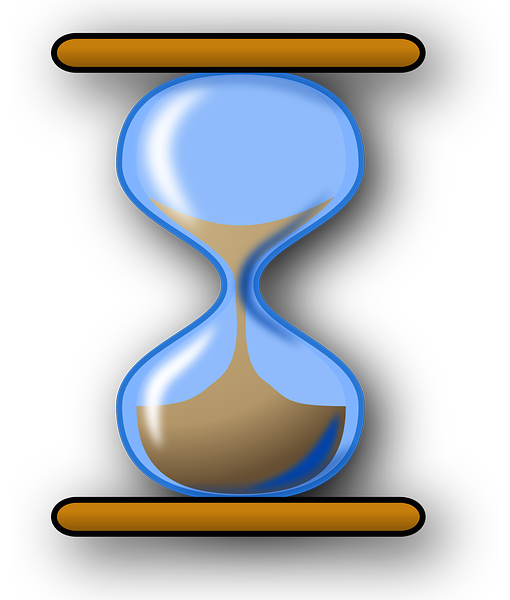
#3: Grade Your Essays With the Official Rubrics
Be ruthless in identifying your essay weaknesses by comparing your GRE essays to the standards set forth in the rubrics for the Issues and Arguments essays and grading your practice essays accordingly. Don’t give yourself the benefit of the doubt, because the GRE essay grader and computer program grader won’t.
Sample GRE essays at each score point are helpful in giving you concrete examples of the points made in the rubric for each score level (as we’ll discuss in the next GRE essay tip). If you’re still concerned you can’t be objective enough about your own writing, find a GRE essay buddy to help you grade your work according to the rubrics.
Learn more about this topic with our guide to how the GRE essay is scored .
#4: Write Practice Essays With Pre-Existing Samples You Can Compare
When choosing essay prompts to practice on, you should start out by choosing topics that ETS has sample essays on , so you can compare your responses to the anchor ones that have already been scored by ETS.
Understanding the GRE writing rubric is important for doing well on the test, since that’s what the real GRE essay graders will be using to score your responses, but it can sometimes be difficult to take the abstract ideals of a rubric and see how your own writing measures up. It’s easier to see how you’ve done when you compare your writing to how others have written on the same topic.
Currently, the ETS website has one Issues task and one Argument task with sample scored essay responses free and publicly available. There are two additional instances each for the Issues and Argument tasks in the answer keys of Chapters 8 and 9 of The Official Guide to the GRE revised General Test (2nd edition) . To get access to these four prompts with sample essays, you can either purchase the guide or take it out of your local library, if they have it.
#5: Only Use Official Prompts
There are 328 official GRE writing prompts available (152 Issue and 176 Argument), so there’s very little point in practicing for the essay with non-official prompts.
The only reason to use non-official GRE essay prompts is if they’re the six bonus prompts on ScoreItNow! which will get your essay scored by the e-scorer software that the real GRE uses (more on that below). Otherwise, writing practice essays on non-official prompts is just not worth it.
#6: Do Mock Analyses of Official Prompts
As mentioned in the previous tip, there are so many GRE essay prompts that you won’t run out of topics to practice with (unless you’re planning on spending 164 hours doing practice Analytical Writing essays). Because of this, you can supplement your GRE Writing practice by practicing outlining essays without having to write out a full essay.
For practice Issue essay outlines, you should come up with at least three examples and a few bullet points to explain how each one supports your point. Work on not just explaining the content of each example, but on showing how the example is relevant to the issue and why the example is evidence to back up your position.
For practice Argument essay outlines, come up with at least three points of analysis and a few bullet points to explain the importance of each. These points of analysis could be the assumptions made in the argument, what evidence is needed to evaluate the argument, alternative explanations, and so on.

#7: Try ScoreItNow! or POWERPREP PLUS Online
For $20, ScoreItNow! lets you get two essays on real GRE prompts (plus six essays on bonus non-official prompts) scored by the e-rater used for the real GRE. You won’t receive human grading on your essays, but you will at least receive a grade and insights into how the e-rater might score your writing on the real test. If you write fewer than 50 or more than 1,000 words you’ll get an “advisory” notice and won’t get a grade on ScoreItNow! (although if the reason you got an advisory notice is because your essay was too long, you can get a refund).
ScoreItNow! is pretty pricey ($10 per real GRE essay scored) so it’s not a good choice for everyone, but if you are concerned about how your writing will fare on the GRE, particularly with a computer grader, it’s good to know this is an option.
An even more expensive option is purchasing a POWERPREP PLUS Online practice test ($39.95 per test per purchase; you may only take the test once per purchase, and it expires after 90 days). With each of the two adaptive practice tests, you’ll be able to submit one Issue and one Argument essay to be scored by the e-rater. You should only go with this option if you plan on taking advantage of the full computer-based practice test as well as getting your essays scored; otherwise, ScoreItNow! is the more cost-effective option for official GRE essay grading.
#8: Leave Time to Review and Edit Your Work
As I mentioned in the first tip, the GRE Writing word processor has no spell check, no grammar check, and no auto-correct. Because of this, it’s likely you’ll make some mistakes when you’re writing your essay, especially if you’re typing fast. It’s okay to make a few small mistakes , but if your essay is riddled with spelling and grammatical errors, that will make it difficult to understand, which will have a negative effect on your score. Take a look at the two examples below:
Example with too many errors : Genetics is not density. The argument that naure is paramount over nurture failes, to ake into acount, the eyr reel affects that environment can ahve on behavior.
Example with minor errors : Genetics is not destiny. The argument that naure is paramount over nurture fails to take into account the very reel effects that environment can have on behavior.
In the second example, there are still some errors (“naure” instead of “nature,” “reel” instead of “real”), but the meaning is much clearer. Leaving yourself time to read over and edit your work will make sure you don’t end up with an essay that looks like the first example.
In other cases, it’s necessary to edit for clarity not only for mechanical things like spelling and punctuation, but also to make sure your ideas are organized in a way that makes sense. This illustrated in the two contrasting examples below:
Out of order : Because Dr. Field visited only Tertia, while Dr. Karp visited “the group of islands that includes Tertia,” it’s possible that the children Dr. Karp interviewed were primarily from islands other than Tertia, reflecting a bias towards those other islands’ cultures. Similarly, without knowing more about the sample sizes of Dr. Field and Dr. Karp’s studies and of the populations they were studying, it’s hard to know if the two studies are at all comparable. Another important question that would need to be answered in order to make this recommendation would be whether or not the group of islands including Tertia that Dr. Karp visited had similar cultures.
Better ordered : Another important question that would need to be answered in order to make this recommendation would be whether or not the group of islands including Tertia that Dr. Karp visited had similar cultures. Because Dr. Field visited only Tertia, while Dr. Karp visited “the group of islands that includes Tertia,” it’s possible that the children Dr. Karp interviewed were primarily from islands other than Tertia, reflecting a bias towards those other islands’ cultures. Similarly, without knowing more about the sample sizes of Dr. Field and Dr. Karp’s studies and of the populations they were studying, it’s hard to know if the two studies are at all comparable.
Want to improve your GRE score by 7 points? We have the industry's leading GRE prep program. Built by world-class instructors with 99th percentile GRE scores , the program learns your strengths and weaknesses through machine learning data science, then customizes your prep program to you so you get the most effective prep possible.
Try our 5-day full access trial for free:
#9: You Don’t Need a Perfect GRE Essay Score
Your GRE Writing score is a very, very small part of most grad school apps. A 4.5 or above is good enough for most programs , and there’s certainly no need to sweat over not getting a perfect 6.0. The reason for this is that even if the rest of your application is mediocre, a high Writing score won’t have a huge positive effect on your chances.
Once you manage to get a 4.5 (or higher, if programs you’re applying to have a higher score cut-off), it’s far better to spend your time on your Verbal and Quantitative scores, GRE subject test scores, or other parts of your grad school applications.
#10: Write Essays as Part of Full-Length Practice Tests
The Analytical Writing questions are the first section on the GRE, so you’ll be full of energy as well as test-taking adrenaline. However, this first hour of writing is then followed by 4-5 more sections (depending on whether or not you get an experimental section), so you can’t expend all your energy in the essays.
As part of your preparation for the GRE, you need to learn how to conserve your concentration and stamina, and the best way to do this is by taking realistic practice tests. This ties in with the advice in Tips 1, 2, and 5, which all aim to get you the most realistic testing experience possible. Only by doing a practice GRE in realistic conditions can you know what will be a problem for you on test day and address the issue.

In addition to our top ten general GRE Analytical Writing tips, we have five strategies specific to the two different types of essay questions.
GRE Essay Tips: Analyze an Issue Advice
For the Issue essay, you’re asked to explain whether you agree or disagree with something and why. The general structure of the task means that there are a couple of things you can do to write a good essay on every Issues prompt, no matter the topic. Our GRE Writing tips below will help you craft a clear and compelling response.
Issues Tip 1: Always Include a Thesis Statement
If there’s only one tip you follow about the GRE Issue essay, it should be this one: always, ALWAYS include a thesis that clearly articulates your position , whether you agree or disagree with the perspective presented.
If you don’t state a position, you are neglecting a fundamental aspect of the Issue essay task. There are six different variations on the issue task wording, but every single one of them requires you to either discuss your views explicitly or explain whether you agree or disagree with a given statement, recommendation, or claim. Failing to state your point of view in your essay makes it impossible for the graders to judge how well you’ve supported your position, and will result in a low essay score.
Issue Tip 2: Preplan Essay Opinions and Examples
You can’t memorize 152 different essays for each possible Issues prompt, but there are enough similarities between the different prompts that you can research some examples ahead of time to use as support.
Start by formulating your own opinions about common issues topics like the role of government and public officials, activities in everyday life, and teaching. Next, pick evidence you can use to support each of those opinions. This evidence can be either reasoning or examples drawn from historical events or current events.
When it comes time for the Issue essay, you’ll be able to draw from this pool of examples and reasoning to support your position; at the very least, even if the exact examples or reasoning isn’t applicable to the specific topic, you’ll be in the habit of thinking of ways examples and reasoning could support your point of view.
Find out more about how to get a perfect score on the GRE Issue essay here .

GRE Essay Tips: Analyze an Argument Advice
For all “Analyze an Argument” Analytical Writing questions, you’re asked to judge the soundness of an argument. Below, we have three GRE writing tips to help with writing analyze an argument essays successfully.
Argument Tip 1: Focus on the Task
Don’t get caught up in analyzing whether the author’s claims are true or false, or whether or not you agree with them or what your own views are – that’s not the task. Instead, analyze the logic behind the argument being made and the flaws (or lack of flaws) in the argument’s construction.
Staying focused on the task may take practice, as you might find it difficult to be objective about some of the arguments made due to personal experience or outrage at some of the logical jumps being made. To do well on the argument essay, harness that rage into analysis and explanation of how the argument is flawed.
Learn more about how to do this in our discussion of how to get a perfect 6 on the GRE Argument essay .
Argument Tip 2: Only Write About Major Points
Because you only have 30 minutes for the GRE argument essay, you don’t have to analyze every single facet of the argument. It’s more important to analyze major features that contribute to the argument’s efficacy (or lack thereof).
Imagine yourself like a lawyer in a courtroom, trying to get across the story of the case to the jurors. You can’t dwell on every single detail that proves your opponent is incorrect or your case will be a shapeless mess of information, even if all of it is true. Instead, you need to hit the main points first and then, if you have time, you can circle back to minutiae.
Argument Tip 3: Only Use Information Included in the Argument
The GRE is pretty good about using made-up names and places for the prompts, so you won’t be tempted to use outside knowledge to make assumptions. Still, you should make sure you confine your analysis to what’s written in the prompt only and don’t assume beyond what’s there.
Sticking to the information included in the prompt is an important part of completing many of the argument tasks, since the arguments are often flawed due to unstated assumptions. As a test taker, it’s your job to point out those flaws, not make more assumptions of your own.

What’s Next?
When you’re studying, it’s important to have an end goal. Find out what’s a good GRE writing score here !
Looking for the source of all GRE Writing prompts? Look no further – we have over 60 official prompts and links to the others in this complete list of GRE essay topics .
Unsure of what a good GRE essay looks like? Then be sure to read through our analyses of perfect scoring GRE essay samples .
Want to improve your GRE score by 7+ points?
Check out our best-in-class online GRE prep program . We guarantee your money back if you don't improve your GRE score by 7 points or more.
PrepScholar GRE is entirely online, and it customizes your prep program to your strengths and weaknesses . We also feature 2,000 practice questions , official practice tests, 150 hours of interactive lessons, and 1-on-1 scoring and feedback on your AWA essays.
Check out our 5-day free trial now:
Ready to improve your GRE score by 7 points?
Author: Laura Staffaroni
Laura graduated magna cum laude from Wellesley College with a BA in Music and Psychology, and earned a Master's degree in Composition from the Longy School of Music of Bard College. She scored 99 percentile scores on the SAT and GRE and loves advising students on how to excel and fulfill their college and grad school dreams. View all posts by Laura Staffaroni


Choose Your Test
Sat / act prep online guides and tips, the ultimate sat essay study guide: tips and review.

We've written the best guide to the SAT essay available anywhere.
To craft this guide, we have carefully read all official material available on the SAT essay from the College Board and read the best SAT books we could find and extracted the most important things you need to know to succeed on the essay section. Based on this research, we're confident that this is the most complete and comprehensive resource available for the SAT essay.
This guide gets deep into every aspect of the SAT essay, from the rubric to prompts to the nuts and bolts of how to write a high-scoring essay . You'll learn the best tips and strategies to use to maximize the value of your SAT essay practice as well as how much time to devote to prepping for the essay.
If you're looking for a comprehensive guide to SAT essay and how to improve your SAT essay scores, this guide is invaluable. Rather than trying to put all the information we've distilled into one long article, we've created this multi-sectioned guide to serve as a table of contents to each of our more in-depth articles.
We'll start by taking a high-level look at the importance of the SAT essay to colleges and which schools care about your SAT essay score. The next section delves into more of the details of the SAT essay prompt and rubric and outlines step-by-step how to write a perfect-scoring SAT essay. Finally, the third part of this guide takes you through tips and strategies to use with the SAT essay.
We suggest reading through this guide in order your first time through, as you would any other test prep resource. Alternatively, if you're just looking for a refresher on certain areas, you can use this guide as a reference you can jump around in as needed.
UPDATE: SAT Essay No Longer Offered
(adsbygoogle = window.adsbygoogle || []).push({});.
In January 2021, the College Board announced that after June 2021, it would no longer offer the Essay portion of the SAT (except at schools who opt in during School Day Testing). It is now no longer possible to take the SAT Essay, unless your school is one of the small number who choose to offer it during SAT School Day Testing.
While most colleges had already made SAT Essay scores optional, this move by the College Board means no colleges now require the SAT Essay. It will also likely lead to additional college application changes such not looking at essay scores at all for the SAT or ACT, as well as potentially requiring additional writing samples for placement.
What does the end of the SAT Essay mean for your college applications? Check out our article on the College Board's SAT Essay decision for everything you need to know.
What Do Colleges Think About the SAT Essay?
Something that makes the SAT essay different from all the other sections of the SAT is its optional nature. The articles in this section will inform you about why colleges don't all require the SAT essay and whether or not it makes sense for you to take the SAT with the essay.
Does the SAT Essay Matter? Expert Guide
With the changes to the SAT essay, the importance of your SAT essay score to your college applications has grown somewhat murky. Read this article to find out why colleges still require the essay and what kind of effect it has on your college application.
Should I Take the SAT Essay? How to Decide
There are both positive and negative aspects of taking the SAT essay. This guide goes through different arguments for and against taking the SAT essay and helps you figure out which scenarios apply for you.
Which Colleges Require the SAT Essay? Complete List
Depending on which colleges you want to apply to, you may not need to take the SAT essay at all. Find out if the schools you're interested in require or recommend you take the SAT essay with this article.
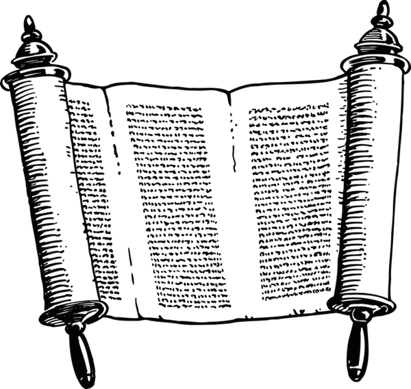
Understanding SAT Essay Prompts and the SAT Essay Rubric
The next set of articles unpack the SAT essay prompt and the best way to fulfill the requirements of the essay task. You'll learn how to write consistently high-scoring SAT essays and how to preplan examples and explanations to use on the real SAT essay.
New SAT Essay Prompts: How Are They Changing?
If you're just starting your prep or are unfamiliar with the SAT essay, this article is a great introduction to the essay section. In it, we analyze the difference between the old SAT essay and the current essay for those who took the old SAT and want to see how the new essay differs. This article is also a good summary to come back to if you need a refresher on what the SAT essay asks you to do.
SAT Essay Prompts: The Complete List
One of the most important ways to improve at writing the SAT essay is to practice with official SAT essay prompts. In this article, you'll find all the free and publicly released official SAT prompts currently available, along with instructions on the best ways to use the prompts in your studying.
How to Get a Perfect 8|8|8 SAT Essay Score
Excelling on the SAT essay requires understanding the difference between an almost-perfect and a perfect-scoring essay. This article will take you through my complete analysis of a perfect-scoring SAT essay and how to improve your score. You'll learn what to be sure to do and what to avoid when writing and the key areas to focus on for maximal score increase.
How to Write an SAT Essay, Step by Step
Learn the ins and outs of writing a perfect-scoring SAT essay by following along as we go through the reading, analyzing and planning, writing, and revising stages of a sample essay. You'll get to see the whole process, from scribbled handwritten planning notes to the polished final product. At each step, you'll also discover strategies to enhance your SAT essay writing process.
SAT Essay Rubric: Full Analysis and Writing Strategies
Dive into the intricacies of SAT essay scoring with this item-by-item look at the SAT essay rubric. You'll learn about what you need to accomplish in your essay to achieve high Reading, Analysis, and Writing scores. Plus, you'll get tips on the best way to use the rubric as part of your SAT essay practice.
What's the Average SAT Essay Score?
Read this article to get a good idea of how scores are distributed on the SAT essay and how much your scores really matter.
The Most Reliable SAT Essay Template and Format
On the SAT essay, you'll always be asked to accomplish the same task (explain how the author makes their argument), which makes it possible to plan out your essay's structure ahead of time. This article teaches you how to create your own SAT essay templates for the new SAT.
6 SAT Essay Examples to Answer Every Prompt
Every SAT essay requires reading a passage and analyzing how the author constructs her argument. You can't prepare ahead of time by analyzing the exact passage that will be used, but you can familiarize yourself with techniques frequently used to add impact to argumentative essays.
Learn how to identify the six persuasive techniques most commonly found in SAT essay prompts and the effect each technique has on the reader with this guide.

SAT Essay Strategies and Tips
Now you've gotten both a basic understanding of what the SAT essay is and a good grasp of what's required to write the best SAT essay possible. Huge success!
The next step is to take that knowledge and understanding and apply it in the most effective ways. To help you with that, we've compiled our top strategies and tips for when to take the SAT essay and how to make your SAT essay practice as efficient as possible.
SAT Essay Tips: 15 Ways to Improve Your Score
Your time is a limited and valuable resource when it comes to the SAT essay, both in terms of how much time you have to spend prepping and the 50 minutes you get to analyze and write about the prompt on the real SAT. Read this article to find out what tweaks you can make to your essay writing process that will have a large positive impact on your essay score.
Does Messy Handwriting Hurt Your SAT Essay Score?
Essay graders are trained to read all sorts of handwriting, so it's not likely your essay will be completely thrown out because the graders can't read it. However, even occasionally illegible handwriting can still affect your essay score in negative ways. Find out how messy handwriting might negatively affect your essay score and how to fix the problem in this article.

What's Next?
There's a lot of information in this guide to digest, but your SAT essay practice shouldn't stop at reading this articles and strategy guides. The best way to prep for the SAT essay is to write timed essays in response to real SAT essay prompts .
Before you score your essay on the rubric, be sure to read through our guide to diagnosing your weaknesses and reviewing your mistakes . The article uses examples of multiple choice questions, but the strategies of honing in on your weak spots work equally well for the essay.
Above all, stay motivated ! And if you liked this guide, don't forget to read our other ultimate SAT prep guides for SAT Reading , Writing and Language , and Math .
Want to improve your SAT score by 160 points?
Check out our best-in-class online SAT prep program . We guarantee your money back if you don't improve your SAT score by 160 points or more.
Our program is entirely online, and it customizes what you study to your strengths and weaknesses . If you liked this SAT Essay lesson, you'll love our program. Along with more detailed lessons, you'll get your SAT essays hand-graded by a master instructor who will give you customized feedback on how you can improve. We'll also give you a step-by-step program to follow so you'll never be confused about what to study next.
Check out our 5-day free trial:

Laura graduated magna cum laude from Wellesley College with a BA in Music and Psychology, and earned a Master's degree in Composition from the Longy School of Music of Bard College. She scored 99 percentile scores on the SAT and GRE and loves advising students on how to excel in high school.
Student and Parent Forum
Our new student and parent forum, at ExpertHub.PrepScholar.com , allow you to interact with your peers and the PrepScholar staff. See how other students and parents are navigating high school, college, and the college admissions process. Ask questions; get answers.

Ask a Question Below
Have any questions about this article or other topics? Ask below and we'll reply!
Improve With Our Famous Guides
- For All Students
The 5 Strategies You Must Be Using to Improve 160+ SAT Points
How to Get a Perfect 1600, by a Perfect Scorer
Series: How to Get 800 on Each SAT Section:
Score 800 on SAT Math
Score 800 on SAT Reading
Score 800 on SAT Writing
Series: How to Get to 600 on Each SAT Section:
Score 600 on SAT Math
Score 600 on SAT Reading
Score 600 on SAT Writing
Free Complete Official SAT Practice Tests
What SAT Target Score Should You Be Aiming For?
15 Strategies to Improve Your SAT Essay
The 5 Strategies You Must Be Using to Improve 4+ ACT Points
How to Get a Perfect 36 ACT, by a Perfect Scorer
Series: How to Get 36 on Each ACT Section:
36 on ACT English
36 on ACT Math
36 on ACT Reading
36 on ACT Science
Series: How to Get to 24 on Each ACT Section:
24 on ACT English
24 on ACT Math
24 on ACT Reading
24 on ACT Science
What ACT target score should you be aiming for?
ACT Vocabulary You Must Know
ACT Writing: 15 Tips to Raise Your Essay Score
How to Get Into Harvard and the Ivy League
How to Get a Perfect 4.0 GPA
How to Write an Amazing College Essay
What Exactly Are Colleges Looking For?
Is the ACT easier than the SAT? A Comprehensive Guide
Should you retake your SAT or ACT?
When should you take the SAT or ACT?
Stay Informed
Get the latest articles and test prep tips!
Looking for Graduate School Test Prep?
Check out our top-rated graduate blogs here:
GRE Online Prep Blog
GMAT Online Prep Blog
TOEFL Online Prep Blog
Holly R. "I am absolutely overjoyed and cannot thank you enough for helping me!”

- Peterborough

Studying for Essay Exams
- Can you study for an essay exam?
- The challenge of essay exams
- Study Strategy 1: Create a study guide
- Study Strategy 2: Try to guess the questions
- Study Strategy 3: Study from old exams
- Study Strategy 4: Outline or write possible answers
- Study Strategy 5: Study in a group
Can you study for an essay exam?
Yes, you can! Many students mistakenly think that, because essay exams focus on analysis rather than memorization, they cannot really “study” for an essay exam. However, essay exams generally require you to pull together information from different parts of the course to create a coherent answer and to support an interpretation with specific examples. That is pretty hard to do well if you haven’t studied the course material! Indeed, there are a number of study strategies that are well-suited to preparing for an essay exam.
The Challenge of Essay Exams
Essay exams require you to interpret a complex and often lengthy question, develop a coherent thesis statement that addresses this question, and write an essay that provides specific evidence to develop and support this thesis. And, it requires you to do all of this under time pressure.
Meeting these challenges will require that you study in ways that will allow you to recognize both the major themes and ideas of the course as well as the specific facts, events, authors, or examples that are associated with those themes.
Study Strategy 1: Create a Study Guide
Essay exams require you to show connections between details, to gather up the specifics and tie them together with the major themes of the course. One of the best ways to prepare for this is to create a study guide.
A study guide is a document that attempts to identify the major themes and synthesize information from different units or weeks of the course. In a study guide, you list information from different units together under thematic categories. Here are some tips on creating a good study guide.
Step 1 : Read through lecture notes and reading notes and list the main themes of the class. This is not a list of facts, dates, events or authors, but of themes and ideas. For example, in your History 1500, this would NOT be a list of events or dates. It would be themes: terror and the state, religion and terror, technology and terror. In English 1000, your list would NOT be a list of authors or books that you have read. Instead, it would be a list of themes that are common to them: literary techniques, self and society, gender etc.
Step 2 : Now go back and read through your notes again. This time, you are looking for details such as authors, key terms, events, and examples. Use these details to flesh out your study guide and to show how the details build your understanding of the themes.
Sample Study Guide for History 1500
Theme: Religion and Terror
Module: Witch Craze
- Catholicism and beliefs in white and dark magic
- The Reformation/Wars of Religion brought social, cultural, and economic disruption, which bred anxiety.
- Most intense hunting = 1550-1650 (religious wars = c.1540-1648)
- Proximity to religious tension increases tendency to burn witches
Module: Crusades – List relevant examples
Study Strategy 2: Try to Guess the Questions
When professors write essay questions, they usually review the material they have covered and try to choose topics that will require students to bring together the major themes of the course. By guessing the questions that will be on the exam, you will engage in the same process. Look through your syllabus, lecture and reading notes, and study guide. What concepts or themes have been developed throughout the term? What questions would you ask if you were the professor?
Study Strategy 3: Study from Old Exams
While you are guessing the questions and preparing for an essay exam, it can be very helpful to consult previous exams in the course. While it is unlikely that a professor would use exactly the same questions again on your exam, it can be helpful to get a sense of the types of questions that have been asked in the past. Some professors share old exams with their classes. However, in classes where this is not the case, you can seek out sample questions from your textbook, syllabus, or assignment instructions. There are great online sources of sample questions from textbook publishers, but take caution when searching online. Some sites that crowdsource student work encourage acts of academic dishonesty; students should never share old exam questions or answers.
Study Strategy 4: Outline or Write Possible Answers
Trying to identify what questions might be on the exam is, of course, only one part of studying for the exam. You also need to try to create answers to these questions. You can do this by outlining answers. Begin with a clear thesis that addresses the question, and then create a section of the outline that develops each part of your thesis. Finally, add in specific examples that you would use to support your ideas in the appropriate section.
You can also write full answers to the essay questions you devise as you study. The act of writing will help you to remember the material, and although the identical question may not appear on the exam, you will usually be able to employ the connections and supporting details in a response that addresses similar issues.
Study Strategy 5: Study in a Group
One of the best ways to learn material is to talk about it with others. As you do, you deepen your understanding not only by having to explain concepts or themes to others but also by hearing their perspective on the central issues of the course.
While you will ultimately take an exam, and thus need to know course information, on your own, study groups can be a great supplement to independent study activities. Each group member could come prepared with one or two potential exam questions, and then other group members could try to answer them. Or, the entire group could review the course syllabus together and identify central themes or particularly challenging material. Through the process of discussing the information with others, you will increase your understanding and thus be studying for your essay exam.
7-Week SSP & 2-Week Pre-College Program are still accepting applications until April 10, or earlier if all course waitlists are full. 4-Week SSP Application is closed.
Celebrating 150 years of Harvard Summer School. Learn about our history.
Top 10 Study Tips to Study Like a Harvard Student
Adjusting to a demanding college workload might be a challenge, but these 10 study tips can help you stay prepared and focused.
Lian Parsons
The introduction to a new college curriculum can seem overwhelming, but optimizing your study habits can boost your confidence and success both in and out of the classroom.
Transitioning from high school to the rigor of college studies can be overwhelming for many students, and finding the best way to study with a new course load can seem like a daunting process.
Effective study methods work because they engage multiple ways of learning. As Jessie Schwab, psychologist and preceptor at the Harvard College Writing Program, points out, we tend to misjudge our own learning. Being able to recite memorized information is not the same as actually retaining it.
“One thing we know from decades of cognitive science research is that learners are often bad judges of their own learning,” says Schwab. “Memorization seems like learning, but in reality, we probably haven’t deeply processed that information enough for us to remember it days—or even hours—later.”
Planning ahead and finding support along the way are essential to your success in college. This blog will offer study tips and strategies to help you survive (and thrive!) in your first college class.
1. Don’t Cram!
It might be tempting to leave all your studying for that big exam up until the last minute, but research suggests that cramming does not improve longer term learning.
Students may perform well on a test for which they’ve crammed, but that doesn’t mean they’ve truly learned the material, says an article from the American Psychological Association . Instead of cramming, studies have shown that studying with the goal of long-term retention is best for learning overall.
2. Plan Ahead—and Stick To It!
Having a study plan with set goals can help you feel more prepared and can give you a roadmap to follow. Schwab said procrastination is one mistake that students often make when transitioning to a university-level course load.
“Oftentimes, students are used to less intensive workloads in high school, so one of my biggest pieces of advice is don’t cram,” says Schwab. “Set yourself a study schedule ahead of time and stick to it.”
3. Ask for Help
You don’t have to struggle through difficult material on your own. Many students are not used to seeking help while in high school, but seeking extra support is common in college.
As our guide to pursuing a biology major explains, “Be proactive about identifying areas where you need assistance and seek out that assistance immediately. The longer you wait, the more difficult it becomes to catch up.”
There are multiple resources to help you, including your professors, tutors, and fellow classmates. Harvard’s Academic Resource Center offers academic coaching, workshops, peer tutoring, and accountability hours for students to keep you on track.
4. Use the Buddy System
Your fellow students are likely going through the same struggles that you are. Reach out to classmates and form a study group to go over material together, brainstorm, and to support each other through challenges.
Having other people to study with means you can explain the material to one another, quiz each other, and build a network you can rely on throughout the rest of the class—and beyond.
5. Find Your Learning Style
It might take a bit of time (and trial and error!) to figure out what study methods work best for you. There are a variety of ways to test your knowledge beyond simply reviewing your notes or flashcards.
Schwab recommends trying different strategies through the process of metacognition. Metacognition involves thinking about your own cognitive processes and can help you figure out what study methods are most effective for you.
Schwab suggests practicing the following steps:
- Before you start to read a new chapter or watch a lecture, review what you already know about the topic and what you’re expecting to learn.
- As you read or listen, take additional notes about new information, such as related topics the material reminds you of or potential connections to other courses. Also note down questions you have.
- Afterward, try to summarize what you’ve learned and seek out answers to your remaining questions.
Explore summer courses for high school students.
6. Take Breaks
The brain can only absorb so much information at a time. According to the National Institutes of Health , research has shown that taking breaks in between study sessions boosts retention.
Studies have shown that wakeful rest plays just as important a role as practice in learning a new skill. Rest allows our brains to compress and consolidate memories of what we just practiced.
Make sure that you are allowing enough time, relaxation, and sleep between study sessions so your brain will be refreshed and ready to accept new information.

7. Cultivate a Productive Space
Where you study can be just as important as how you study.
Find a space that is free of distractions and has all the materials and supplies you need on hand. Eat a snack and have a water bottle close by so you’re properly fueled for your study session.
8. Reward Yourself
Studying can be mentally and emotionally exhausting and keeping your stamina up can be challenging.
Studies have shown that giving yourself a reward during your work can increase the enjoyment and interest in a given task.
According to an article for Science Daily , studies have shown small rewards throughout the process can help keep up motivation, rather than saving it all until the end.
Next time you finish a particularly challenging study session, treat yourself to an ice cream or an episode of your favorite show.
9. Review, Review, Review
Practicing the information you’ve learned is the best way to retain information.
Researchers Elizabeth and Robert Bjork have argued that “desirable difficulties” can enhance learning. For example, testing yourself with flashcards is a more difficult process than simply reading a textbook, but will lead to better long-term learning.
“One common analogy is weightlifting—you have to actually “exercise those muscles” in order to ultimately strengthen your memories,” adds Schwab.
10. Set Specific Goals
Setting specific goals along the way of your studying journey can show how much progress you’ve made. Psychology Today recommends using the SMART method:
- Specific: Set specific goals with an actionable plan, such as “I will study every day between 2 and 4 p.m. at the library.”
- Measurable: Plan to study a certain number of hours or raise your exam score by a certain percent to give you a measurable benchmark.
- Realistic: It’s important that your goals be realistic so you don’t get discouraged. For example, if you currently study two hours per week, increase the time you spend to three or four hours rather than 10.
- Time-specific: Keep your goals consistent with your academic calendar and your other responsibilities.
Using a handful of these study tips can ensure that you’re getting the most out of the material in your classes and help set you up for success for the rest of your academic career and beyond.
Learn more about our summer programs for high school students.
About the Author
Lian Parsons is a Boston-based writer and journalist. She is currently a digital content producer at Harvard’s Division of Continuing Education. Her bylines can be found at the Harvard Gazette, Boston Art Review, Radcliffe Magazine, Experience Magazine, and iPondr.
Becoming Independent: Skills You’ll Need to Survive Your First Year at College
Are you ready? Here are a few ideas on what it takes to flourish on campus.
Harvard Division of Continuing Education
The Division of Continuing Education (DCE) at Harvard University is dedicated to bringing rigorous academics and innovative teaching capabilities to those seeking to improve their lives through education. We make Harvard education accessible to lifelong learners from high school to retirement.

Have a language expert improve your writing
Run a free plagiarism check in 10 minutes, generate accurate citations for free.
- Knowledge Base
- How to write an essay introduction | 4 steps & examples
How to Write an Essay Introduction | 4 Steps & Examples
Published on February 4, 2019 by Shona McCombes . Revised on July 23, 2023.
A good introduction paragraph is an essential part of any academic essay . It sets up your argument and tells the reader what to expect.
The main goals of an introduction are to:
- Catch your reader’s attention.
- Give background on your topic.
- Present your thesis statement —the central point of your essay.
This introduction example is taken from our interactive essay example on the history of Braille.
The invention of Braille was a major turning point in the history of disability. The writing system of raised dots used by visually impaired people was developed by Louis Braille in nineteenth-century France. In a society that did not value disabled people in general, blindness was particularly stigmatized, and lack of access to reading and writing was a significant barrier to social participation. The idea of tactile reading was not entirely new, but existing methods based on sighted systems were difficult to learn and use. As the first writing system designed for blind people’s needs, Braille was a groundbreaking new accessibility tool. It not only provided practical benefits, but also helped change the cultural status of blindness. This essay begins by discussing the situation of blind people in nineteenth-century Europe. It then describes the invention of Braille and the gradual process of its acceptance within blind education. Subsequently, it explores the wide-ranging effects of this invention on blind people’s social and cultural lives.
Instantly correct all language mistakes in your text
Upload your document to correct all your mistakes in minutes

Table of contents
Step 1: hook your reader, step 2: give background information, step 3: present your thesis statement, step 4: map your essay’s structure, step 5: check and revise, more examples of essay introductions, other interesting articles, frequently asked questions about the essay introduction.
Your first sentence sets the tone for the whole essay, so spend some time on writing an effective hook.
Avoid long, dense sentences—start with something clear, concise and catchy that will spark your reader’s curiosity.
The hook should lead the reader into your essay, giving a sense of the topic you’re writing about and why it’s interesting. Avoid overly broad claims or plain statements of fact.
Examples: Writing a good hook
Take a look at these examples of weak hooks and learn how to improve them.
- Braille was an extremely important invention.
- The invention of Braille was a major turning point in the history of disability.
The first sentence is a dry fact; the second sentence is more interesting, making a bold claim about exactly why the topic is important.
- The internet is defined as “a global computer network providing a variety of information and communication facilities.”
- The spread of the internet has had a world-changing effect, not least on the world of education.
Avoid using a dictionary definition as your hook, especially if it’s an obvious term that everyone knows. The improved example here is still broad, but it gives us a much clearer sense of what the essay will be about.
- Mary Shelley’s Frankenstein is a famous book from the nineteenth century.
- Mary Shelley’s Frankenstein is often read as a crude cautionary tale about the dangers of scientific advancement.
Instead of just stating a fact that the reader already knows, the improved hook here tells us about the mainstream interpretation of the book, implying that this essay will offer a different interpretation.
Prevent plagiarism. Run a free check.
Next, give your reader the context they need to understand your topic and argument. Depending on the subject of your essay, this might include:
- Historical, geographical, or social context
- An outline of the debate you’re addressing
- A summary of relevant theories or research about the topic
- Definitions of key terms
The information here should be broad but clearly focused and relevant to your argument. Don’t give too much detail—you can mention points that you will return to later, but save your evidence and interpretation for the main body of the essay.
How much space you need for background depends on your topic and the scope of your essay. In our Braille example, we take a few sentences to introduce the topic and sketch the social context that the essay will address:
Now it’s time to narrow your focus and show exactly what you want to say about the topic. This is your thesis statement —a sentence or two that sums up your overall argument.
This is the most important part of your introduction. A good thesis isn’t just a statement of fact, but a claim that requires evidence and explanation.
The goal is to clearly convey your own position in a debate or your central point about a topic.
Particularly in longer essays, it’s helpful to end the introduction by signposting what will be covered in each part. Keep it concise and give your reader a clear sense of the direction your argument will take.
Here's why students love Scribbr's proofreading services
Discover proofreading & editing
As you research and write, your argument might change focus or direction as you learn more.
For this reason, it’s often a good idea to wait until later in the writing process before you write the introduction paragraph—it can even be the very last thing you write.
When you’ve finished writing the essay body and conclusion , you should return to the introduction and check that it matches the content of the essay.
It’s especially important to make sure your thesis statement accurately represents what you do in the essay. If your argument has gone in a different direction than planned, tweak your thesis statement to match what you actually say.
To polish your writing, you can use something like a paraphrasing tool .
You can use the checklist below to make sure your introduction does everything it’s supposed to.
Checklist: Essay introduction
My first sentence is engaging and relevant.
I have introduced the topic with necessary background information.
I have defined any important terms.
My thesis statement clearly presents my main point or argument.
Everything in the introduction is relevant to the main body of the essay.
You have a strong introduction - now make sure the rest of your essay is just as good.
- Argumentative
- Literary analysis
This introduction to an argumentative essay sets up the debate about the internet and education, and then clearly states the position the essay will argue for.
The spread of the internet has had a world-changing effect, not least on the world of education. The use of the internet in academic contexts is on the rise, and its role in learning is hotly debated. For many teachers who did not grow up with this technology, its effects seem alarming and potentially harmful. This concern, while understandable, is misguided. The negatives of internet use are outweighed by its critical benefits for students and educators—as a uniquely comprehensive and accessible information source; a means of exposure to and engagement with different perspectives; and a highly flexible learning environment.
This introduction to a short expository essay leads into the topic (the invention of the printing press) and states the main point the essay will explain (the effect of this invention on European society).
In many ways, the invention of the printing press marked the end of the Middle Ages. The medieval period in Europe is often remembered as a time of intellectual and political stagnation. Prior to the Renaissance, the average person had very limited access to books and was unlikely to be literate. The invention of the printing press in the 15th century allowed for much less restricted circulation of information in Europe, paving the way for the Reformation.
This introduction to a literary analysis essay , about Mary Shelley’s Frankenstein , starts by describing a simplistic popular view of the story, and then states how the author will give a more complex analysis of the text’s literary devices.
Mary Shelley’s Frankenstein is often read as a crude cautionary tale. Arguably the first science fiction novel, its plot can be read as a warning about the dangers of scientific advancement unrestrained by ethical considerations. In this reading, and in popular culture representations of the character as a “mad scientist”, Victor Frankenstein represents the callous, arrogant ambition of modern science. However, far from providing a stable image of the character, Shelley uses shifting narrative perspectives to gradually transform our impression of Frankenstein, portraying him in an increasingly negative light as the novel goes on. While he initially appears to be a naive but sympathetic idealist, after the creature’s narrative Frankenstein begins to resemble—even in his own telling—the thoughtlessly cruel figure the creature represents him as.
If you want to know more about AI tools , college essays , or fallacies make sure to check out some of our other articles with explanations and examples or go directly to our tools!
- Ad hominem fallacy
- Post hoc fallacy
- Appeal to authority fallacy
- False cause fallacy
- Sunk cost fallacy
College essays
- Choosing Essay Topic
- Write a College Essay
- Write a Diversity Essay
- College Essay Format & Structure
- Comparing and Contrasting in an Essay
(AI) Tools
- Grammar Checker
- Paraphrasing Tool
- Text Summarizer
- AI Detector
- Plagiarism Checker
- Citation Generator
Your essay introduction should include three main things, in this order:
- An opening hook to catch the reader’s attention.
- Relevant background information that the reader needs to know.
- A thesis statement that presents your main point or argument.
The length of each part depends on the length and complexity of your essay .
The “hook” is the first sentence of your essay introduction . It should lead the reader into your essay, giving a sense of why it’s interesting.
To write a good hook, avoid overly broad statements or long, dense sentences. Try to start with something clear, concise and catchy that will spark your reader’s curiosity.
A thesis statement is a sentence that sums up the central point of your paper or essay . Everything else you write should relate to this key idea.
The thesis statement is essential in any academic essay or research paper for two main reasons:
- It gives your writing direction and focus.
- It gives the reader a concise summary of your main point.
Without a clear thesis statement, an essay can end up rambling and unfocused, leaving your reader unsure of exactly what you want to say.
The structure of an essay is divided into an introduction that presents your topic and thesis statement , a body containing your in-depth analysis and arguments, and a conclusion wrapping up your ideas.
The structure of the body is flexible, but you should always spend some time thinking about how you can organize your essay to best serve your ideas.
Cite this Scribbr article
If you want to cite this source, you can copy and paste the citation or click the “Cite this Scribbr article” button to automatically add the citation to our free Citation Generator.
McCombes, S. (2023, July 23). How to Write an Essay Introduction | 4 Steps & Examples. Scribbr. Retrieved April 2, 2024, from https://www.scribbr.com/academic-essay/introduction/
Is this article helpful?
Shona McCombes
Other students also liked, how to write a thesis statement | 4 steps & examples, academic paragraph structure | step-by-step guide & examples, how to conclude an essay | interactive example, unlimited academic ai-proofreading.
✔ Document error-free in 5minutes ✔ Unlimited document corrections ✔ Specialized in correcting academic texts
25 Scientifically Proven Tips for More Effective Studying

Staying on top of schoolwork can be tough.
Whether you’re in high school, or an adult going back to college, balancing coursework with other responsibilities can be challenging. If you’re teetering on the edge of burnout, here are some study tips that are scientifically proven to help you succeed!
2024 Ultimate Study Tips Guide
In this guide, we explore scientifically-proven study techniques from scientific journals and some of the world’s best resources like Harvard, Yale, MIT, and Cornell.
In a hurry? Skip ahead to the section that interests you most.
- How to Prepare for Success
- Create Your Perfect Study Space
- Pick a Study Method that Works for You
- Effective Study Skills
- How to Study More Efficiently
- How to Study for Tests
- Memory Improvement Techniques
- Top 10 Study Hacks Backed by Science
- Best Study Apps
- Study Skills Worksheets
- Key Takeaways
This comprehensive guide covers everything from studying for exams to the best study apps. So, let’s get started!
Part 1 – How to Prepare for Success

1. Set a Schedule
“Oh, I’ll get to it soon” isn’t a valid study strategy. Rather, you have to be intentional about planning set study sessions .
On your calendar, mark out chunks of time that you can devote to your studies. You should aim to schedule some study time each day, but other commitments may necessitate that some sessions are longer than others.
Harder classes require more study time. So, too, do classes that are worth several credits. For each credit hour that you’re taking, consider devoting one to three hours to studying each week.
2. Study at Your Own Pace
Do you digest content quickly, or do you need time to let the material sink in? Only you know what pace is best for you.
There’s no right (or wrong) study pace. So, don’t try matching someone else’s speed.
Instead, through trial and error, find what works for you. Just remember that slower studying will require that you devote more time to your schoolwork.
3. Get Some Rest
Exhaustion helps no one perform their best. Your body needs rest ; getting enough sleep is crucial for memory function.
This is one reason that scheduling study time is so important: It reduces the temptation to stay up all night cramming for a big test. Instead, you should aim for seven or more hours of sleep the night before an exam.

Limit pre-studying naps to 15 or 20 minutes at a time. Upon waking, do a few stretches or light exercises to prepare your body and brain for work.
4. Silence Your Cell Phone
Interruptions from your phone are notorious for breaking your concentration. If you pull away to check a notification, you’ll have to refocus your brain before diving back into your studies.
Consider turning off your phone’s sounds or putting your device into do not disturb mode before you start. You can also download apps to temporarily block your access to social media .
If you’re still tempted to check your device, simply power it off until you’re finished studying.
Research shows that stress makes it harder to learn and to retain information.
Stress-busting ideas include:
- Taking deep breaths
- Writing down a list of tasks you need to tackle
- Doing light exercise
Try to clear your head before you begin studying.
Part 2 – Create Your Perfect Study Space

1. Pick a Good Place to Study
There’s a delicate balance when it comes to the best study spot : You need a place that’s comfortable without being so relaxing that you end up falling asleep. For some people, that means working at a desk. Others do better on the couch or at the kitchen table. Your bed, on the other hand, may be too comfy.
Surrounding yourself with peace and quiet helps you focus. If your kids are being loud or there’s construction going on outside your window, you might need to relocate to an upstairs bedroom, a quiet cafe or your local library.
2. Choose Your Music Wisely
Noise-canceling headphones can also help limit distractions.
It’s better to listen to quiet music than loud tunes. Some people do best with instrumental music playing in the background.

Songs with lyrics may pull your attention away from your textbooks. However, some folks can handle listening to songs with words, so you may want to experiment and see what works for you.
Just remember that there’s no pressure to listen to any music. If you do your best work in silence, then feel free to turn your music player off.
3. Turn Off Netflix
If song lyrics are distracting, just imagine what an attention sucker the television can be! Serious studying requires that you turn off the TV.
The same goes for listening to radio deejays. Hearing voices in the background takes your brainpower off of your studies.
4. Use Background Sounds
Turning off the television, talk radio and your favorite pop song doesn’t mean that you have to study in total silence. Soft background sounds are a great alternative.
Some people enjoy listening to nature sounds, such as ocean waves or cracks of thunder. Others prefer the whir of a fan.
5. Snack on Brain Food
A growling stomach can pull your mind from your studies, so feel free to snack as you work. Keep your snacks within arm’s reach, so you don’t have to leave your books to find food.
Fuel your next study session with some of the following items:
- Lean deli meat
- Grapes or apple slices
- Dark chocolate
Go for snacks that will power your brain and keep you alert. Steer clear of items that are high in sugar, fat and processed carbs.
Part 3 – Pick a Study Method That Works for You
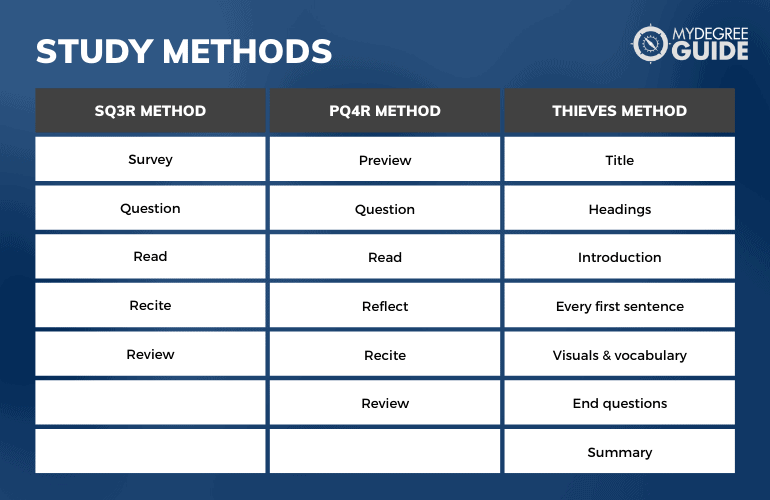
Mindlessly reading through your notes or textbooks isn’t an effective method of studying; it doesn’t help you process the information. Instead, you should use a proven study strategy that will help you think through the material and retain the information.
Strategy #1 – SQ3R Method
With the SQ3R approach to reading , you’ll learn to think critically about a text.
There are five steps:
- Survey : Skim through the assigned material. Focus on headings, words in bold print and any diagrams.
- Question : Ask yourself questions related to the topic.
- Read : Read the text carefully. As you go, look for answers to your questions.
- Recite : Tell yourself the answers to your questions. Write notes about them, even.
- Review : Go over the material again by rereading the text and reading your notes aloud.
Strategy #2 – PQ4R Method
PQ4R is another study strategy that can help you digest the information you read.
This approach has six steps:
- Preview : Skim the material. Read the titles, headings and other highlighted text.
- Question : Think through questions that pertain to the material.
- Read : As you work through the material, try to find answers to your questions.
- Reflect : Consider whether you have any unanswered questions or new questions.
- Recite : Speak aloud about the things you just read.
- Review : Look over the material one more time.
Strategy #3 – THIEVES Method
The THIEVES approach can help you prepare to read for information.
There are seven pre-reading steps:
- Title : Read the title.
- Headings : Look through the headings.
- Introduction : Skim the intro.
- Every first sentence in a section : Take a look at how each section begins.
- Visuals and vocabulary : Look at the pictures and the words in bold print.
- End questions : Review the questions at the end of the chapter.
- Summary : Read the overview of the text.
Ask yourself thought-provoking questions as you work through these steps. After completing them, read the text.
Studying Online
Although these three study strategies can be useful in any setting, studying online has its own set of challenges.
Dr. Tony Bates has written a thoughtful and thorough guide to studying online, A Student Guide to Studying Online . Not only does he highlight the importance of paying attention to course design, but he also offers helpful tips on how to choose the best online program and manage your course load.
Part 4 – Effective Study Skills
1. Highlight Key Concepts
Looking for the most important information as you read helps you stay engaged with the material . This can help keep your mind from wandering as you read.
As you find important details, mark them with a highlighter, or underline them. It can also be effective to jot notes along the edges of the text. Write on removable sticky notes if the book doesn’t belong to you.
When you’re preparing for a test, begin your studies by reviewing your highlighted sections and the notes you wrote down.
2. Summarize Important Details
One good way to get information to stick in your brain is to tell it again in your own words. Writing out a summary can be especially effective. You can organize your summaries in paragraph form or in outline form.
Keep in mind that you shouldn’t include every bit of information in a summary. Stick to the key points.
Consider using different colors on your paper. Research shows that information presented in color is more memorable than things written in plain type. You could use colored pens or go over your words with highlighters.
After writing about what you read, reinforce the information yet again by reading aloud what you wrote on your paper.
3. Create Your Own Flashcards
For an easy way to quiz yourself , prepare notecards that feature a keyword on one side and important facts or definitions about that topic on the reverse.
Writing out the cards will help you learn the information. Quizzing yourself on the cards will continue that reinforcement.
The great thing about flashcards is that they’re easily portable. Slip them in your bag, so you can pull them out whenever you have a spare minute. This is a fantastic way to squeeze in extra practice time outside of your regularly scheduled study sessions.
As an alternative to paper flashcards, you can also use a computer program or a smartphone app to make digital flashcards that you can click through again and again.

4. Improve Recall with Association
Sometimes your brain could use an extra hand to help you hold onto the information that you’re studying. Creating imaginary pictures, crafting word puzzles or doing other mental exercises can help make your material easier to remember.
Try improving recall with the following ideas:
- Sing the information to a catchy tune.
- Think of a mnemonic phrase in which the words start with the same letters as the words that you need to remember.
- Draw a picture that helps you make a humorous connection between the new information and the things that you already know.
- Envision what it would be like to experience your topic in person. Imagine the sights, sounds, smells and more.
- Think up rhymes or tongue twisters that can help the information stick in your brain.
- Visualize the details with a web-style mind map that illustrates the relationships between concepts.
5. Absorb Information in Smaller Chunks
Think about how you memorize a phone number: You divide the 10-digit number into three smaller groups. It’s easier to get these three chunks to stick in your mind than it is to remember the whole thing as a single string of information.
You can use this strategy when studying by breaking a list down into smaller parts. Work on memorizing each part as its own group.
6. Make Your Own Study Sheet
Condensing your most important notes onto one page is an excellent way to keep priority information at your fingertips. The more you look over this sheet and read it aloud, the better that you’ll know the material.

Furthermore, the act of typing or writing out the information will help you memorize the details. Using different colors or lettering styles can help you picture the information later.
Just like flashcards, a study sheet is portable. You can pull it out of your bag whenever you have a spare minute.
7. Be the Teacher
To teach information to others, you first have to understand it yourself. Therefore, when you’re trying to learn something new, challenge yourself to consider how you’d teach it to someone else. Wrestling with this concept will help you gain a better understanding of the topic.
In fact, you can even recruit a friend, a family member or a study group member to listen to your mini-lesson. Reciting your presentation aloud to someone else will help the details stick in your mind, and your audience may be able to point out gaps in your knowledge.
8. Know When to Call It a Day
Yes, you really can get too much of a good thing. Although your studies are important, they shouldn’t be the only thing in your life. It’s also important to have a social life, get plenty of exercise, and take care of your non-school responsibilities.
Studies show that too much time with your nose in the books can elevate your stress level , which can have a negative effect on your school performance and your personal relationships.
Too much studying may also keep you from getting enough exercise. This could lower your bone density or increase your percentage of body fat.
Part 5 – How to Study More Efficiently

1. Take Regular Breaks
Study sessions will be more productive if you allow yourself to take planned breaks. Consider a schedule of 50 minutes spent working followed by a 10-minute break.
Your downtime provides a good chance to stand up and stretch your legs. You can also use this as an opportunity to check your phone or respond to emails. When your 10 minutes are up, however, it’s time to get back to work.
At the end of a long study session, try to allow yourself a longer break — half an hour, perhaps — before you move on to other responsibilities.
2. Take Notes in Class
The things that your teacher talks about in class are most likely topics that he or she feels are quite important to your studies. So, it’s a good idea to become a thorough note-taker.
The following tips can help you become an efficient, effective note-taker:
- Stick to the main points.
- Use shorthand when possible.
- If you don’t have time to write all the details, jot down a keyword or a name. After class, you can use your textbook to elaborate on these items.
- For consistency, use the same organizational system each time you take notes.
- Consider writing your notes by hand, which can help you remember the information better. However, typing may help you be faster or more organized.
Recording important points is effective because it forces you to pay attention to what’s being said during a lecture.
3. Exercise First
Would you believe that exercise has the potential to grow your brain ? Scientists have shown this to be true!
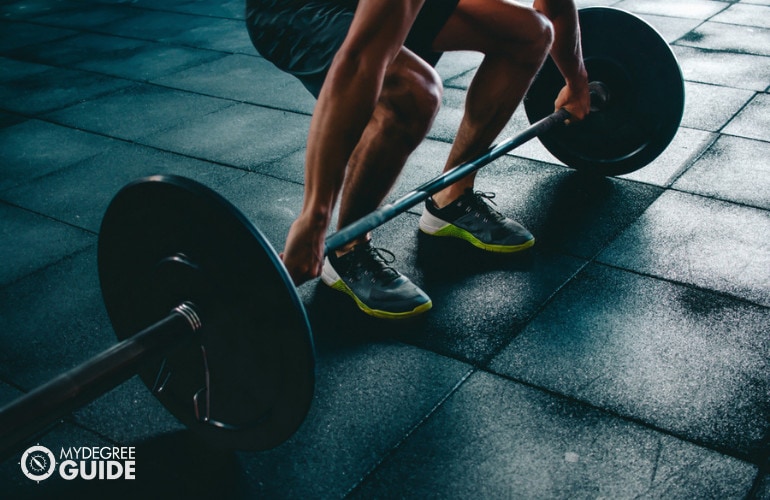
In fact, exercise is most effective at generating new brain cells when it’s immediately followed by learning new information.
There are short-term benefits to exercising before studying as well. Physical activity helps wake you up so you feel alert and ready when you sit down with your books.
4. Review and Revise Your Notes at Home
If your notes are incomplete — for example, you wrote down dates with no additional information — take time after class to fill in the missing details. You may also want to swap notes with a classmate so you can catch things that you missed during the lecture.
- Rewrite your notes if you need to clean them up
- Rewriting will help you retain the information
- Add helpful diagrams or pictures
- Read through them again within one day
If you find that there are concepts in your notes that you don’t understand, ask your professor for help. You may be able to set up a meeting or communicate through email.
After rewriting your notes, put them to good use by reading through them again within the next 24 hours. You can use them as a reference when you create study sheets or flashcards.
5. Start with Your Toughest Assignments
Let’s face it: There are some subjects that you like more than others. If you want to do things the smart way, save your least challenging tasks for the end of your studies. Get the hardest things done first.
If you save the toughest tasks for last, you’ll have them hanging over your head for the whole study session. That can cost you unnecessary mental energy.

Furthermore, if you end with your favorite assignments, it will give you a more positive feeling about your academic pursuits. You’ll be more likely to approach your next study session with a good attitude.
6. Focus on Key Vocabulary
To really understand a subject, you have to know the words that relate to it. Vocabulary words are often written in textbooks in bold print. As you scan the text, write these words down in a list.
Look them up in a dictionary or in the glossary at the back of the book. To help you become familiar with the terms, you could make a study sheet with the definitions or make flashcards.
7. Join a Study Group
Studying doesn’t always have to be an individual activity.
Benefits of a study group include:
- Explaining the material to one another
- Being able to ask questions about things you don’t understand
- Quizzing each other or playing review games
- Learning the material more quickly than you might on your own
- Developing soft skills that will be useful in your career, such as teamwork and problem solving
- Having fun as you study
Gather a few classmates to form a study group.
Part 6 – How to Study for Tests

1. Study for Understanding, Not Just for the Test
Cramming the night before a big test usually involves trying to memorize information long enough to be able to regurgitate it the next morning. Although that might help you get a decent grade or your test, it won’t help you really learn the material .
Within a day or two, you’ll have forgotten most of what you studied. You’ll have missed the goal of your classes: mastery of the subject matter.
Instead, commit yourself to long-term learning by studying throughout the semester.
2. Begin Studying at Least One Week in Advance
Of course, you may need to put in extra time before a big test, but you shouldn’t put this off until the night before.
Instead, in the week leading up to the exam, block off a daily time segment for test preparation. Regular studying will help you really learn the material.
3. Spend at Least One Hour per Day Studying
One week out from a big test, study for an hour per night. If you have two big tests coming up, increase your daily study time, and divide it between the two subjects.

The day before the exam, spend as much time as possible studying — all day, even.
4. Re-write Class Notes
After each class, you should have fleshed out your notes and rewritten them in a neat, organized format. Now, it’s time to take your re-done notes and write them once again.
This time, however, your goal is to condense them down to only the most important material. Ideally, you want your rewritten notes to fit on just one or two sheets of paper.
These sheets should be your main study resource during test preparation.
5. Create a Study Outline
Early in the week, make a long outline that includes many of the details from your notes. Rewrite it a few days later, but cut the material in half.
Shortly before the test, write it one more time; include only the most important information. Quiz yourself on the missing details.
6. Make Your Own Flashcards
Another way to quiz yourself is to make flashcards that you can use for practice written tests.
First, read the term on the front side. Encourage yourself to write out the definition or details of that term. Compare your written answer with what’s on the back of the card.
This can be extra helpful when prepping for an entrance exam like the GRE, though there are a growing number of schools that don’t require GRE scores for admission.
7. Do Sample Problems and Essays from Your Textbook
There are additional things you can do to practice test-taking. For example, crack open your book, and solve problems like the ones you expect to see on the test.
Write out the answers to essay questions as well. There may be suggested essay topics in your textbook.
Part 7 – Memory Improvement Techniques

1. Study Right Before Bed
Although you shouldn’t pull all-nighters, studying right before bedtime can be a great idea.
Sleep helps cement information in your brain. Studies show that you’re more likely to recall information 24 hours later if you went to bed shortly after learning it.
Right before bed, read through your study sheet, quiz yourself on flashcards or recite lists of information.
2. Study Small Chunks at a Time
If you want to remember information over the long haul, don’t try to cram it all in during one sitting.
Instead, use an approach called spaced repetition :
- Break the information into parts
- Learn one new part at a time over the course of days or weeks
- Review your earlier acquisitions each time you study
The brain stores information that it thinks is important. So, when you regularly go over a topic at set intervals over time, it strengthens your memory of it.
3. Tell a Story
Sometimes, you just need to make information silly in order to help it stick in your brain.
To remember a list of items or the particular order of events, make up a humorous story that links those things or words together. It doesn’t necessarily need to make sense; it just needs to be memorable .
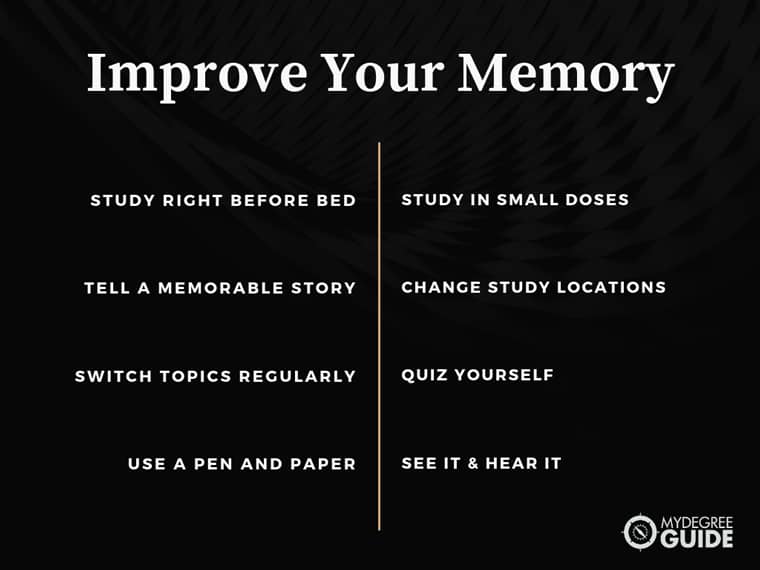
4. Change Study Locations Often
Studying the same information in multiple places helps the details stick in your mind better.
Consider some of the following locations:
- Your desk at home
- A coffee shop
- The library
- Your backyard
It’s best to switch between several different study spots instead of always hitting the books in the same place.
5. Swap Topics Regularly
Keeping your brain trained on the same information for long periods of time isn’t beneficial. It’s smarter to jump from one subject to another a few times during a long study session.
Along those same lines, you should study the same material in multiple ways. Research shows that using varied study methods for the same topic helps you perform better on tests.
6. Quiz Yourself
Challenge yourself to see what you can remember. Quizzing yourself is like practicing for the test, and it’s one of the most effective methods of memory retention .
If it’s hard to remember the information at first, don’t worry; the struggle makes it more likely that you’ll remember it in the end.
7. Go Old-school: Use a Pen and Paper
The act of writing answers helps you remember the information. Here are some ways to use writing while studying:
- Recopy your notes
- Write the answers to flashcards
- Make a study sheet
- Practice writing essay answers
Writing by hand is best because it requires your attention and focus.
8. See It & Hear It
Say information out loud, and you’ll be more likely to remember it. You’re engaging your eyes as you read the words, your mouth as you say them, and your ears as you hear yourself.
Scientists call the benefit of speaking information aloud production effect .
Part 8 – Top 10 Study Hacks Backed by Science

1. Grab a Coffee
Drinking coffee (or your preferred high-octane beverage) while you study may help keep you alert so you don’t doze off mid-session. There’s even evidence that caffeine can improve your memory skills.
However, avoid sugary beverages. These could cause your energy level to crash in a few hours.
2. Reward Yourself
Studies show that giving yourself a reward for doing your work helps you enjoy the effort more.
Do it right away; don’t wait until the test is over to celebrate. For example, after finishing a three-hour study session, treat yourself to an ice cream cone or a relaxing bath.
3. Study with Others
Working with a study group holds you accountable so it’s harder to procrastinate on your work.
When you study together, you can fill in gaps in one another’s understanding, and you can quiz each other on the material.
Besides, studying with a group can be fun!
4. Meditate
It may be hard to imagine adding anything else to your packed schedule, but dedicating time to mindfulness practices can really pay off.

Studies show that people who meditate may perform better on tests , and they are generally more attentive.
Mindfulness apps can help you get started with this practice.
5. Hit the Gym
To boost the blood flow to your brain, do half an hour of cardio exercise before sitting down to study.
Aerobic exercise gives your brain a major dose of oxygen and other important nutrients, which may help you think clearly, remember facts and do your best work.
6. Play Some Music
Listening to tunes can help you focus. Studies show that the best study music is anything that features a rhythmic beat .
It’s smart to choose a style that you like. If you like classical, that’s fine, but you could also go for electronica or modern piano solos.
7. Grab Some Walnuts
A diet rich in omega-3 fatty acids helps your brain do its best work.
Good sources include:
- Fish: cod liver oil, salmon and mackerel
- Vegetables: spinach and Brussels sprouts
To calm your pre-test jitters, eat a mix of omega-3 and omega-6 foods.
8. Take Regular Breaks
Your brain needs some downtime. Don’t try to push through for hours on end. Every hour, take a break for several minutes.

Breaks are good for your mental health . They also improve your attention span, your creativity and your productivity.
During a break, it’s best to move around and exercise a bit.
9. Get Some Sleep
Although studying is important, it can’t come at the expense of your rest. Sleep gives your brain a chance to process the information that you’ve learned that day.
If you don’t get enough sleep, you’ll have a hard time focusing and remembering information.
Even during busy test weeks, try to get seven to nine hours of sleep each night.
10. Eliminate Distractions
It’s hard to get much studying done when you’re busy scrolling Instagram. Put away your phone and computer while studying, or at least block your social media apps.
Turn off the television while you work, too.
If you’re studying in a noisy area, put on headphones that can help block the distracting sounds.
Part 9 – The Best Study Apps

1. iStudiez Pro Legend
Scheduling study time is a must, and iStudiez Pro Legend lets you put study sessions, classes and assignments on your calendar. Color coding the entries can help you stay organized.
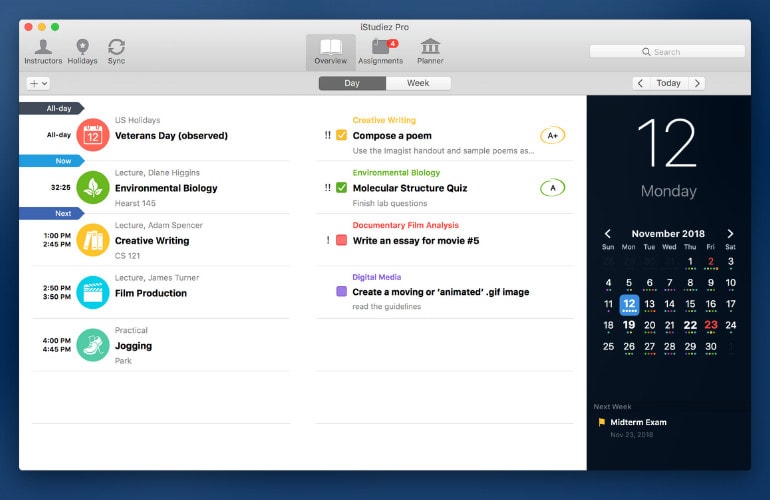
For each class, you can enter meeting times and homework assignments, and you can keep track of your grades.
2. Dragon Anywhere
Instead of writing notes in the margins of your textbooks, you can use Dragon Anywhere’s voice dictation feature to record your thoughts and insights.
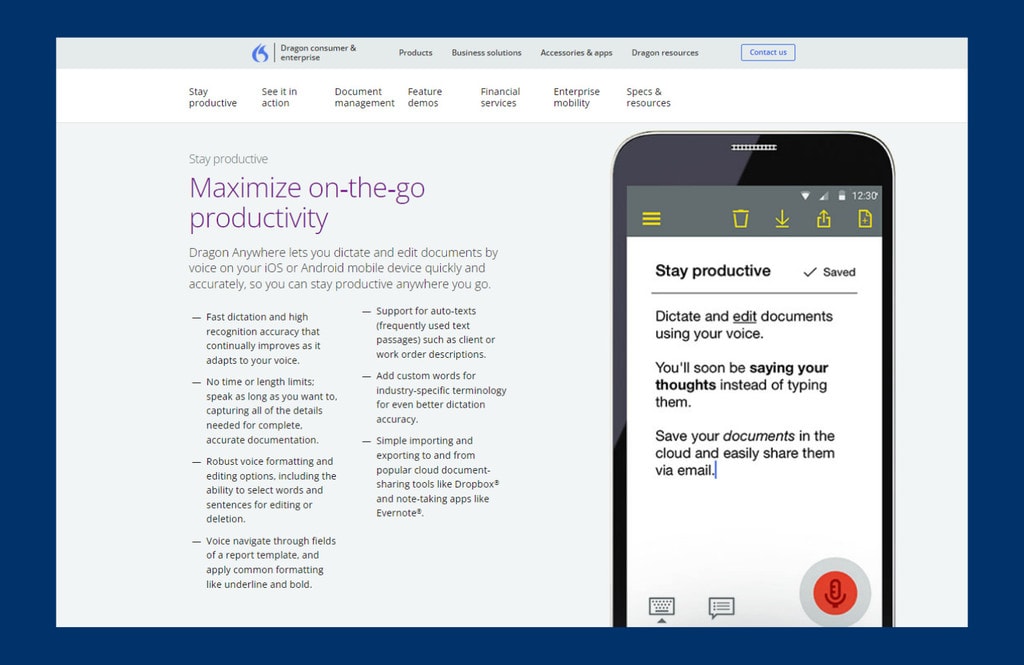
Just be sure to rewrite your dictated notes in your own handwriting later for maximum learning!
3. Evernote
When you’re in school, you have a lot of responsibilities to juggle, but Evernote can help you organize them.
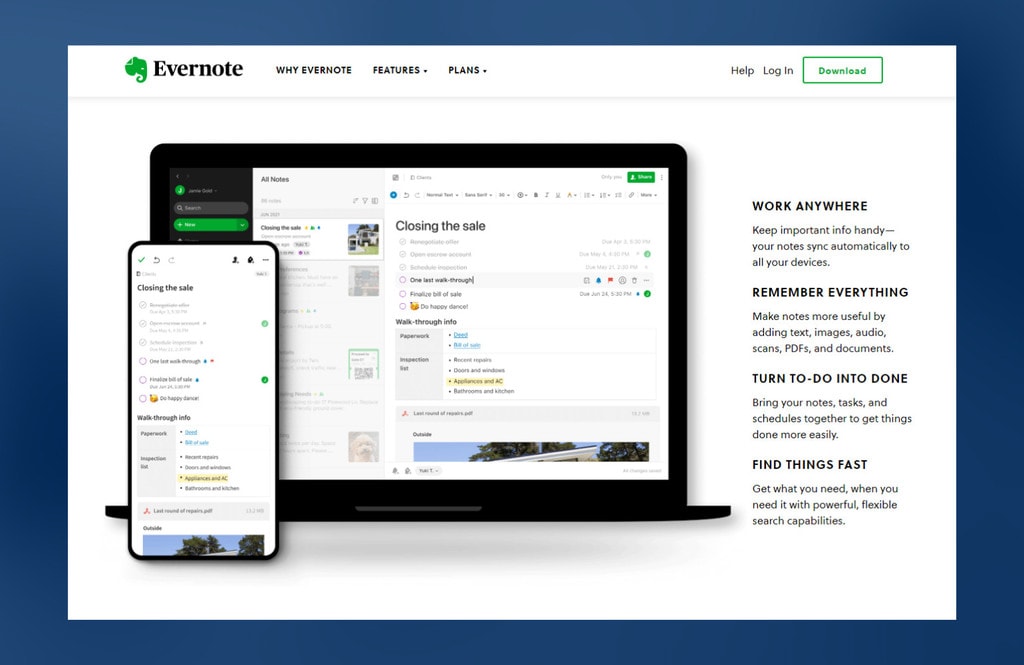
You can add notes and documents to store them in one digital spot, and tagging them will help you quickly pull up all files for a class or a topic.
4. Quizlet Go
Make digital flashcards that you can practice on your mobile device with Quizlet Go .

This means that you can pull out your phone for a quick study session whenever you have a couple of minutes of downtime. You don’t even need internet access to practice these flashcards.
5. My Study Life
Enter your upcoming tests and assignments into My Study Life , and the app will send you reminder messages.
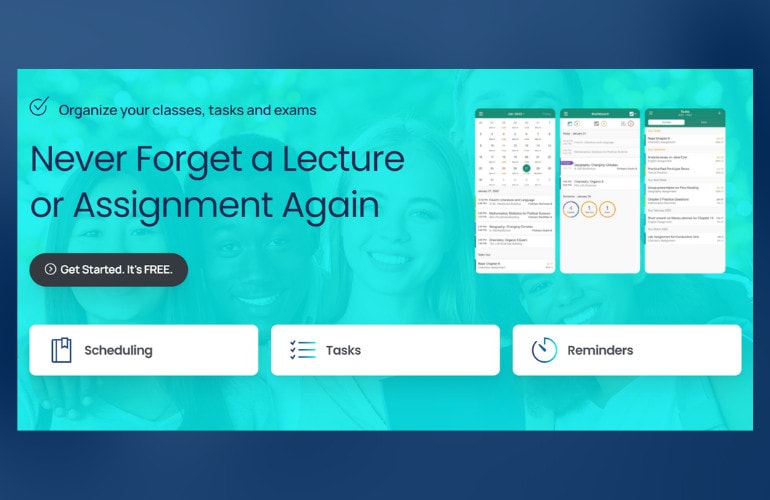
The app has a calendar so you can keep track of your class schedule. It can even notify you when it’s time to go to class.
6. Exam Countdown Lite
You should start studying for tests at least a week in advance. Input the dates for your exams and assignments into Exam Countdown Lite so you’ll have a visual reminder of when you should begin your test prep.
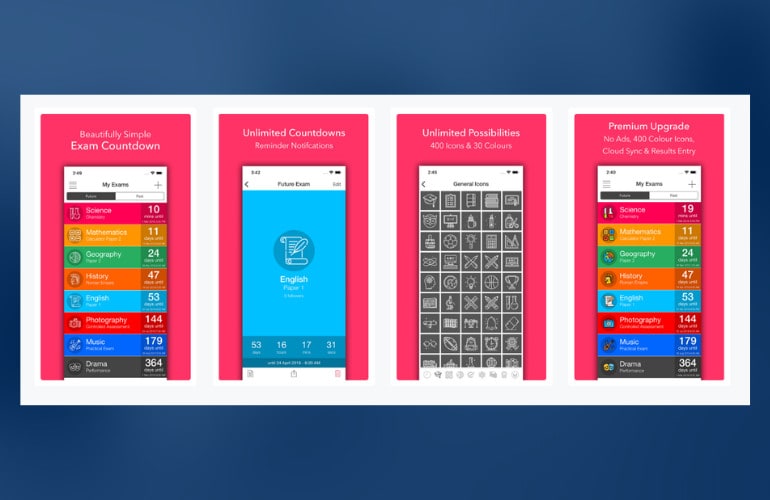
The app can send you notifications as well.
7. Flashcards+
With Chegg’s Flashcards+ , you can make your own digital flashcards or use ones designed by others.
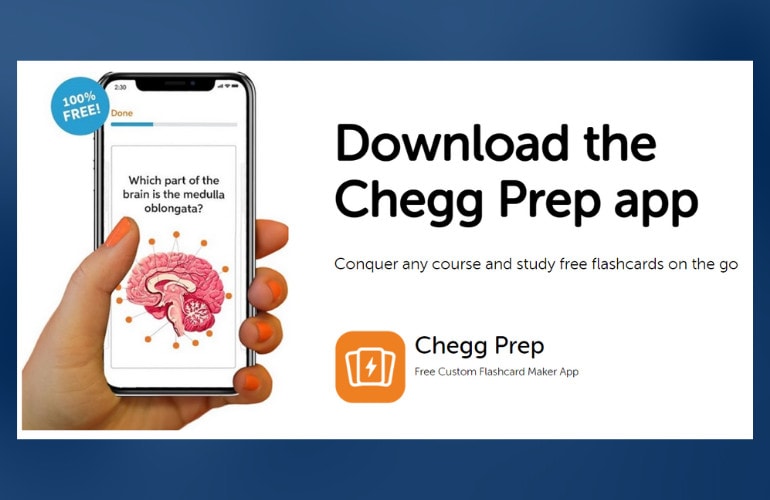
Because you can add images to your cards, you can quiz yourself on the names of famous artworks, important historical artifacts or parts of a scientific diagram.
Organize information into categories by creating a visual mind map on XMind . This can help you classify facts and figures so you see how they relate to one another.

This visual representation can also help you recall the information later.
9. ScannerPro
Do you have piles of handwritten notes everywhere? Once you have written them out, consider scanning them into digital form. ScannerPro lets you use your phone as a scanner.

You can store your scanned files in this app or transfer them to Evernote or another organization system.
Part 10 – Study Skills Worksheets
Could you use more help to develop your study skills? Rutgers University has dozens of study skills worksheets online .
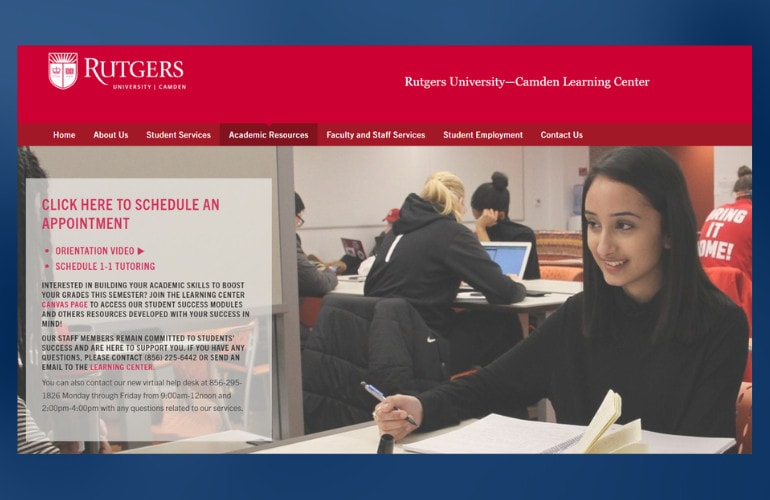
These documents are packed with tips that can help you become a better student. The checklists and charts can help you evaluate your current strengths and organize your work.
Part 11 – Key Takeaways

You’re a busy person, so you need to make the most of every study session.
By now, you should understand the basics of effective studies:
- Schedule study time
- Study regularly
- Minimize distractions
- Read for information
- Write the important stuff down
- Use creative memory tricks
- Quiz yourself
- Be good to your body and your brain
Put these study tips to good use, and you’ll soon learn that you’ve learned how to study smarter.


ESA and NASA team up to study solar wind
In the run up to April’s total solar eclipse, ESA-led Solar Orbiter and NASA-led Parker Solar Probe are both at their closest approach to the Sun. Tomorrow, they are taking the opportunity to join hands in studying the driving rain of plasma that streams from the Sun, fills the Solar System, and causes dazzlement and destruction at Earth.
Both Solar Orbiter and Parker Solar Probe have very eccentric orbits, meaning that they fly in near to the Sun to get a close-up look, and then fly far out to give their onboard tech a chance to recover from the intense heat and radiation. During the next week, for the first time ever, the two spacecraft will both be at their closest approach to the Sun – what we call the ‘perihelion’ – at the same time.
What’s more, this closest approach coincides with Solar Orbiter and Parker Solar Probe being at right angles to each other as they look towards the Sun.
Daniel Müller, ESA Solar Orbiter Project Scientist, explains why this positioning is special. “On this day, we have a unique spacecraft configuration, where Solar Orbiter will have its full suite of instruments pointed towards the region on the Sun where the solar wind is produced that will hit Parker Solar Probe a few hours later.”

Scientists will compare data collected by both missions to better understand the properties of the solar wind. Because Solar Orbiter is at its closest to the Sun, its telescopes will observe with the highest resolution. The simultaneous close approach by Parker Solar Probe means that only a few hours after the source regions of the solar wind have been imaged by Solar Orbiter, the plasma of this nearly pristine solar wind be sampled in space by Parker Solar Probe. This will allow scientists to better understand the link between the Sun and its heliosphere, the huge plasma bubble it blows into space.
But wait… at its closest approach, Solar Orbiter is 45 million km from the Sun, whilst Parker Solar Probe is just 7.3 million km away. So how does Solar Orbiter observe something that later hits Parker Solar Probe?
To answer this question, we need to look at the difference between remote sensing and in situ instruments. Both missions carry both instrument types on board, but whilst Solar Orbiter carries more remote sensing instruments, Parker Solar Probe carries mostly in situ instruments (no current camera technology could look at the Sun from so close a distance and survive).

Remote sensing instruments work like a camera or our eyes; they detect light waves coming from the Sun at different wavelengths. As light travels at 300 000 km/s, it takes 2.5 minutes to reach Solar Orbiter’s instruments at closest approach.
Meanwhile, Parker Solar Probe’s in situ instruments work more like our nose or tastebuds. They directly ‘taste’ the particles and fields in the immediate vicinity of the spacecraft. In this case, Parker Solar Probe will measure solar wind particles that travel away from the Sun at speeds of more than a million kilometres per hour. Though this seems very fast, it is more than 500 times slower than the speed of light.
“In principle, Solar Orbiter alone can use both methods,” points out Andrei Zhukov from the Royal Observatory of Belgium, who is working on the joint observations. “However, Parker Solar Probe comes much closer to the Sun, so can directly measure the properties of the solar wind – like its density and temperature – closer to its birthplace, before these properties change on its journey away from the Sun.”

“We will really hit the jackpot if Solar Orbiter observes a coronal mass ejection (CME) heading towards Parker Solar Probe,” adds Andrei. “We will then be able to see the restructuring of the Sun’s outer atmosphere during the CME in great detail, and compare these observations to the structure seen in situ by Parker Solar Probe.”
Teamwork makes the dream work
This is just one example of how Solar Orbiter and Parker Solar Probe are working together throughout their missions. Parker Solar Probe’s instruments are designed to sample the Sun’s corona (its outer atmosphere), targeting the region of space where the coronal plasma detaches to become the solar wind. This gives the scientists direct evidence on the conditions of the plasma in that region, and helps pinpoint how it is accelerated outwards towards the planets.
Beyond accomplishing its own science goals, Solar Orbiter will provide contextual information to improve the understanding of Parker Solar Probe’s in situ measurements. By working together in this way, the two spacecraft will collect complementary data sets, which will allow more science to be distilled from the two missions than either could manage on its own.
Find out more about how the missions complement each other here .

Solar Orbiter helps predict the total solar eclipse
The wispy ring that we see around the Sun during a total solar eclipse is its corona. Solar Orbiter data collected during the next week will also be used to predict the shape that the corona will take during the upcoming eclipse.
Researchers from Predictive Science Inc. use data from telescopes on and around Earth to create a 3D model of the solar corona . In advance of every total solar eclipse, they use this data to predict what the Sun’s corona will look like from Earth.
For the first time, Predictive Science will incorporate data from Solar Orbiter’s Polarimetric and Helioseismic Imager (PHI) instrument. This will allow them to add information on the Sun’s magnetic field from a unique vantage point to improve their prediction.
The prediction is already available here . It will evolve in real time as we approach the eclipse and Solar Orbiter data is added.

Don’t do a Galileo – use eye protection!
The total solar eclipse will cross North America on 8 April 2024 starting around 11:07 local time. Total solar eclipses are rare opportunities to see the Sun’s beautiful outer atmosphere, normally outshone by the brilliant surface. But great care must be taken to wear appropriate eclipse sunglasses in order to avoid eye damage.
Thank you for liking
You have already liked this page, you can only like it once!
Related Links

What is an eclipse?

The science of eclipses
What is a solar eclipse.

Safety tips for observing the Sun
Home › Study Tips › How To Write an Academic Essay? 9 Amazing Tips
How To Write an Academic Essay? 9 Amazing Tips
- Published October 19, 2021
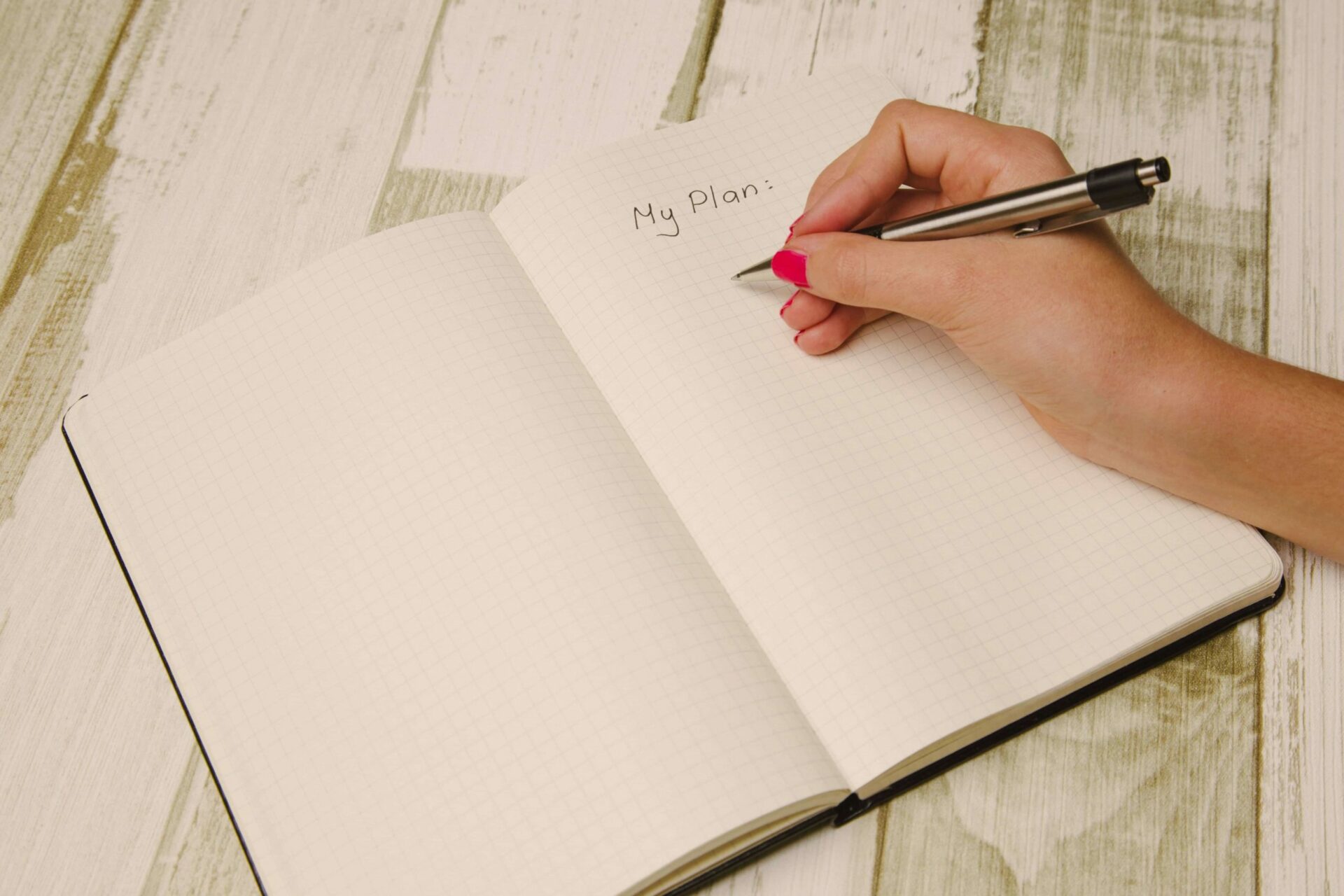
Table of Contents
A regular question by our subscribers, so we’re here to answer ‘how to write an academic essay’?
In order to write a good academic essay and thesis, you must use appropriate language and concise words (and make sure there is plenty of proofreading and editing!).
It can be hard to ensure your essay follows proper conventions so we have compiled a list of things to do and things to avoid to make your essay sound more academic.
Remember before reading this, that you should be planning your essay, and important things to remember include: thesis and introduction, a well-structured body of text, research, and more.
These 9 important pieces of advice will help you be the author of a great academic paper.
1. Avoid Contractions
One question I always get, is should I use contractions? A contraction is a combination of words that have been shortened by either fusing the two words together or the omission of syllables from the two words.
For example, the words:
- aren’t
- don’t
- can’t
are all contractions.
Contractions are the enemy of a formal academic essay. Use them in your everyday conversation, but it is important to leave them out of your essay.
2. Avoid Clichés
Clichés are overused phrases or expressions such as “back to square one”, or “too good to be true”.
You can find hundreds of clichés and you should avoid them at all costs, as you do not need them.
Clichés are not always obvious, so you have to be thorough in your proofreading to ensure that no clichés have made their way into your academic essay.
In essence, avoid using flowery language and make sure you go through the process of knowing that your reader knows what you mean by writing plainly and clearly in your essay.
Advice: Write for the reader!
3. Avoid Colloquialisms and Informal Vocab
Your essay should steer clear of any colloquialisms or informal words, which will make it flow better for the reader. When writing essays be sure to avoid words that you use in everyday conversation such as, totally, basically, super and heaps.
Another important writing process is that you should never use slang or abbreviations in your academic essay. This is especially important when setting the tone in your thesis.
4. Use Academic Vocabulary
Ensure that you use academic vocabulary in your essay to strengthen your argument. Avoid words such as think, use and lots as these sound less academic. If you’re looking for more ways on writing better then our ‘ how to improve your writing ‘ may be of interest to you.
Use descriptive words to help your reader understand key points in your statements, introductions, body and conclusion.
When writing an academic essay, there is important to use academic words throughout the paper. By writing answers to the paper questions with a well-thought-out structure and use of academic vocab, then you’ll be well on your way to pleasing the reader of your paper.
5. Make Your Thesis or Argument Obvious
When writing an academic essay, one of the most important things is to ensure that your argument is clear, obvious and is clearly stated in plain language.
Use strong wording in your thesis or argument to persuade your reader. You can help this by using a careful structure in your essay plan, as well as writing clear coherent paragraphs and sections.
Your thesis statement should be in your introduction paragraph and reviewed in the proofreading process to ensure you have answered the question.
6. Ensure You Are Using the Right Point of View
The point of view in your paper depends on the type of essay you are writing and the task requirements. Always ensure that you are writing from the correct point of view when writing your essay.
Academic essays will either be written in the third person or first person. You should never write an essay in the second person.
7. Use Topic Sentences and Transitions
Each paragraph of your paper should begin with a topic sentence. A topic sentence introduces the main concept or idea of a paragraph.
Similar to topic sentences, transition sentences make your paper flow from one idea to another within a paragraph. Having these smooth transitions make your academic essay clearer and easier to read.
For instance, when editing your thesis you should make sure there is a topic sentence.
Are you looking to study English at university? Then you’ll love our top UK-ranked universities for English Literature .
8. Ensure Your Document is Properly Formatted
The way that your document should be formatted depends on the kind of essay you are writing. Be sure to check with your teacher about the formatting requirements for your essay.
As a standard formatting guide, you should always use a 12-point serif typeface and have a line spacing of 2.0.
Moreover, make sure you are proofread and go through the process of continually editing your essay. By making sure that your papers have coherent introductions (or thesis), a well-structured body, and a conclusion, as well as always answering the essay question, you’ll be well on your way to writing an academic essay.
You can always test your skills out in these exciting writing competitions for students which have some amazing prizes.
9. Make Sure You Are Using the Proper Referencing Guide
There are a number of academic referencing styles available for an essay. The academic referencing style you should use will depend on the type of essay you are writing, or the preference of the person marking it.
Be sure that you are using the correct referencing style as this will contribute to your essay looking and sounding more academic.
Finally, please remember…
Proofreading and editing are some of the most important parts to ensure that you have answered the question and satisfied the readers’ attention. By proofreading and editing multiple times, and even employing proofreading services (thanks Mum and Dad!), will lead to your essay sounding and reading in a more academic tone.
Each section should undergo meticulous proofreading, to ensure the correct words, advice, research, dates, and citations are used.
Motivated to learn how to write the best academic essays?
Are you a motivated 13-18-year-old student looking to get ahead of your competition? If you’re a talented writer looking to unlock the secrets to writing then you can attend our creative writing summer school .
We also have an amazing opportunity to be awarded with a 100% scholarship to our award-winning summer programmes. Click the following link if you’re interested in our essay competition ?
Related Content
Tackling homework anxiety: your guide to a calmer study life.

IMAGES
VIDEO
COMMENTS
The essay writing process consists of three main stages: Preparation: Decide on your topic, do your research, and create an essay outline. Writing: Set out your argument in the introduction, develop it with evidence in the main body, and wrap it up with a conclusion. Revision: Check your essay on the content, organization, grammar, spelling ...
Writing an essay can be a daunting task for many students, but it doesn't have to be. In this blog post, you will learn some simple tips and tricks on how to write an essay, from choosing a topic to editing your final draft. Whether you need to write an essay for school, work, or personal interest, this guide will help you improve your skills and confidence.
The basic structure of an essay always consists of an introduction, a body, and a conclusion. But for many students, the most difficult part of structuring an essay is deciding how to organize information within the body. This article provides useful templates and tips to help you outline your essay, make decisions about your structure, and ...
Tips for Reading an Assignment Prompt. Asking Analytical Questions. Thesis. Introductions. What Do Introductions Across the Disciplines Have in Common? Anatomy of a Body Paragraph. Transitions. Tips for Organizing Your Essay. Counterargument.
Our programmes for 16 to 18 year olds provide a unique insight into what it's like to study a subject at university level. 13-18 years old Our programmes run in a variety of historic and inspiring university locations that give students a true insight into living and studying like an undergraduate at world-leading institutions.
Don't summarize. Avoid explicitly stating the point of your essay. It's far less effective when you spell it out for someone. Delete every single "That's when I realized," "I learned," and "The most important lesson was...". It's unnecessary, unconvincing, and takes the reader out of the moment.
Summary. The "one idea" rule is a simple concept that can help you sharpen your writing, persuade others by presenting your argument in a clear, concise, and engaging way.
Sample College Essay 2 with Feedback. This content is licensed by Khan Academy and is available for free at www.khanacademy.org. College essays are an important part of your college application and give you the chance to show colleges and universities your personality. This guide will give you tips on how to write an effective college essay.
4 Essay Question Study Tips. Review chapter titles. Textbook chapters often refer to themes. Look at each relevant title and think of smaller ideas, chains of events, and relevant terms that fit within that theme. As you take notes, look for teacher code words. If you hear your teacher use words like "once again we see" or "another ...
8. Use different study tips for memorization. You have chosen a place for study, got rid of all distractions, and evaluated the urgency of your tasks. Half the work is done. Now it is time to start working on your study habits. Many articles emphasize the significance of such techniques as visiting lectures, making notes, or reading before bed.
Overall, the tips that were given here involve using the writing process. Prewriting, drafting, revising, editing, and publishing are all important steps to take when writing an essay.
Argument Tip 2: Only Write About Major Points. Because you only have 30 minutes for the GRE argument essay, you don't have to analyze every single facet of the argument. It's more important to analyze major features that contribute to the argument's efficacy (or lack thereof).
This guide gets deep into every aspect of the SAT essay, from the rubric to prompts to the nuts and bolts of how to write a high-scoring essay. You'll learn the best tips and strategies to use to maximize the value of your SAT essay practice as well as how much time to devote to prepping for the essay. If you're looking for a comprehensive ...
Can you study for an essay exam? The challenge of essay exams. Study Strategy 1: Create a study guide. Study Strategy 2: Try to guess the questions. Study Strategy 3: Study from old exams. Study Strategy 4: Outline or write possible answers. Study Strategy 5: Study in a group.
Designate a study area. The best study spot is one that is quiet, well-lit, and in a low-traffic area. Make sure there is a clear workspace to study and write on. Everyone's needs are different, so it is important you find a spot that works for you. Study in short bursts. For every 30 minutes you study, take a short 10-15 minute break to ...
6. Take Breaks. The brain can only absorb so much information at a time. According to the National Institutes of Health, research has shown that taking breaks in between study sessions boosts retention. Studies have shown that wakeful rest plays just as important a role as practice in learning a new skill.
Study Tips - Free Essay Examples and Topic Ideas. Study tips are techniques or strategies that help students improve their learning and retention of information. Effective study tips include creating a study schedule, breaking down material into manageable chunks, practicing active reading and note-taking, using mnemonic devices, seeking help ...
Step 1: Hook your reader. Step 2: Give background information. Step 3: Present your thesis statement. Step 4: Map your essay's structure. Step 5: Check and revise. More examples of essay introductions. Other interesting articles. Frequently asked questions about the essay introduction.
5. Snack on Brain Food. A growling stomach can pull your mind from your studies, so feel free to snack as you work. Keep your snacks within arm's reach, so you don't have to leave your books to find food. Fuel your next study session with some of the following items: Lean deli meat.
1. Conduct Topic Research with AI. Research is a foundational part of writing high-quality content. When something is published, someone's reputation is at stake. Research makes sure that statements, claims, and opinions are backed up to a reasonable degree. Obviously, it's big for academic and business writing.
ESA and NASA team up to study solar wind. In the run up to April's total solar eclipse, ESA-led Solar Orbiter and NASA-led Parker Solar Probe are both at their closest approach to the Sun. Tomorrow, they are taking the opportunity to join hands in studying the driving rain of plasma that streams from the Sun, fills the Solar System, and ...
Our programmes for 16 to 18 year olds provide a unique insight into what it's like to study a subject at university level. 13-18 years old Our programmes run in a variety of historic and inspiring university locations that give students a true insight into living and studying like an undergraduate at world-leading institutions.
Here are some tips from other CPA exam candidates. • Utilize lecture outlines. If available, use the outlines provided by your study materials as a guide. They often summarize the main points ...